- Essay Guides
- Other Essays
- How to Write an Ethics Paper: Guide & Ethical Essay Examples
- Speech Topics
- Basics of Essay Writing
- Essay Topics
- Main Academic Essays
- Research Paper Topics
- Basics of Research Paper Writing
- Miscellaneous
- Chicago/ Turabian
- Data & Statistics
- Methodology
- Admission Writing Tips
- Admission Advice
- Other Guides
- Student Life
- Studying Tips
- Understanding Plagiarism
- Academic Writing Tips
- Basics of Dissertation & Thesis Writing
- Research Paper Guides
- Formatting Guides
- Basics of Research Process
- Admission Guides
- Dissertation & Thesis Guides

How to Write an Ethics Paper: Guide & Ethical Essay Examples

Table of contents
Use our free Readability checker
An ethics essay is a type of academic writing that explores ethical issues and dilemmas. Students should evaluates them in terms of moral principles and values. The purpose of an ethics essay is to examine the moral implications of a particular issue, and provide a reasoned argument in support of an ethical perspective.
Writing an essay about ethics is a tough task for most students. The process involves creating an outline to guide your arguments about a topic and planning your ideas to convince the reader of your feelings about a difficult issue. If you still need assistance putting together your thoughts in composing a good paper, you have come to the right place. We have provided a series of steps and tips to show how you can achieve success in writing. This guide will tell you how to write an ethics paper using ethical essay examples to understand every step it takes to be proficient. In case you don’t have time for writing, get in touch with our professional essay writers for hire . Our experts work hard to supply students with excellent essays.
What Is an Ethics Essay?
An ethics essay uses moral theories to build arguments on an issue. You describe a controversial problem and examine it to determine how it affects individuals or society. Ethics papers analyze arguments on both sides of a possible dilemma, focusing on right and wrong. The analysis gained can be used to solve real-life cases. Before embarking on writing an ethical essay, keep in mind that most individuals follow moral principles. From a social context perspective, these rules define how a human behaves or acts towards another. Therefore, your theme essay on ethics needs to demonstrate how a person feels about these moral principles. More specifically, your task is to show how significant that issue is and discuss if you value or discredit it.
Purpose of an Essay on Ethics
The primary purpose of an ethics essay is to initiate an argument on a moral issue using reasoning and critical evidence. Instead of providing general information about a problem, you present solid arguments about how you view the moral concern and how it affects you or society. When writing an ethical paper, you demonstrate philosophical competence, using appropriate moral perspectives and principles.
Things to Write an Essay About Ethics On
Before you start to write ethics essays, consider a topic you can easily address. In most cases, an ethical issues essay analyzes right and wrong. This includes discussing ethics and morals and how they contribute to the right behaviors. You can also talk about work ethic, code of conduct, and how employees promote or disregard the need for change. However, you can explore other areas by asking yourself what ethics mean to you. Think about how a recent game you watched with friends started a controversial argument. Or maybe a newspaper that highlighted a story you felt was misunderstood or blown out of proportion. This way, you can come up with an excellent topic that resonates with your personal ethics and beliefs.
Ethics Paper Outline
Sometimes, you will be asked to submit an outline before writing an ethics paper. Creating an outline for an ethics paper is an essential step in creating a good essay. You can use it to arrange your points and supporting evidence before writing. It also helps organize your thoughts, enabling you to fill any gaps in your ideas. The outline for an essay should contain short and numbered sentences to cover the format and outline. Each section is structured to enable you to plan your work and include all sources in writing an ethics paper. An ethics essay outline is as follows:
- Background information
- Thesis statement
- Restate thesis statement
- Summarize key points
- Final thoughts on the topic
Using this outline will improve clarity and focus throughout your writing process.
Ethical Essay Structure
Ethics essays are similar to other essays based on their format, outline, and structure. An ethical essay should have a well-defined introduction, body, and conclusion section as its structure. When planning your ideas, make sure that the introduction and conclusion are around 20 percent of the paper, leaving the rest to the body. We will take a detailed look at what each part entails and give examples that are going to help you understand them better. Refer to our essay structure examples to find a fitting way of organizing your writing.
Ethics Paper Introduction
An ethics essay introduction gives a synopsis of your main argument. One step on how to write an introduction for an ethics paper is telling about the topic and describing its background information. This paragraph should be brief and straight to the point. It informs readers what your position is on that issue. Start with an essay hook to generate interest from your audience. It can be a question you will address or a misunderstanding that leads up to your main argument. You can also add more perspectives to be discussed; this will inform readers on what to expect in the paper.
Ethics Essay Introduction Example
You can find many ethics essay introduction examples on the internet. In this guide, we have written an excellent extract to demonstrate how it should be structured. As you read, examine how it begins with a hook and then provides background information on an issue.
Imagine living in a world where people only lie, and honesty is becoming a scarce commodity. Indeed, modern society is facing this reality as truth and deception can no longer be separated. Technology has facilitated a quick transmission of voluminous information, whereas it's hard separating facts from opinions.
In this example, the first sentence of the introduction makes a claim or uses a question to hook the reader.
Ethics Essay Thesis Statement
An ethics paper must contain a thesis statement in the first paragraph. Learning how to write a thesis statement for an ethics paper is necessary as readers often look at it to gauge whether the essay is worth their time.
When you deviate away from the thesis, your whole paper loses meaning. In ethics essays, your thesis statement is a roadmap in writing, stressing your position on the problem and giving reasons for taking that stance. It should focus on a specific element of the issue being discussed. When writing a thesis statement, ensure that you can easily make arguments for or against its stance.
Ethical Paper Thesis Example
Look at this example of an ethics paper thesis statement and examine how well it has been written to state a position and provide reasons for doing so:
The moral implications of dishonesty are far-reaching as they undermine trust, integrity, and other foundations of society, damaging personal and professional relationships.
The above thesis statement example is clear and concise, indicating that this paper will highlight the effects of dishonesty in society. Moreover, it focuses on aspects of personal and professional relationships.
Ethics Essay Body
The body section is the heart of an ethics paper as it presents the author's main points. In an ethical essay, each body paragraph has several elements that should explain your main idea. These include:
- A topic sentence that is precise and reiterates your stance on the issue.
- Evidence supporting it.
- Examples that illustrate your argument.
- A thorough analysis showing how the evidence and examples relate to that issue.
- A transition sentence that connects one paragraph to another with the help of essay transitions .
When you write an ethics essay, adding relevant examples strengthens your main point and makes it easy for others to understand and comprehend your argument.
Body Paragraph for Ethics Paper Example
A good body paragraph must have a well-defined topic sentence that makes a claim and includes evidence and examples to support it. Look at part of an example of ethics essay body paragraph below and see how its idea has been developed:
Honesty is an essential component of professional integrity. In many fields, trust and credibility are crucial for professionals to build relationships and success. For example, a doctor who is dishonest about a potential side effect of a medication is not only acting unethically but also putting the health and well-being of their patients at risk. Similarly, a dishonest businessman could achieve short-term benefits but will lose their client’s trust.
Ethics Essay Conclusion
A concluding paragraph shares the summary and overview of the author's main arguments. Many students need clarification on what should be included in the essay conclusion and how best to get a reader's attention. When writing an ethics paper conclusion, consider the following:
- Restate the thesis statement to emphasize your position.
- Summarize its main points and evidence.
- Final thoughts on the issue and any other considerations.
You can also reflect on the topic or acknowledge any possible challenges or questions that have not been answered. A closing statement should present a call to action on the problem based on your position.
Sample Ethics Paper Conclusion
The conclusion paragraph restates the thesis statement and summarizes the arguments presented in that paper. The sample conclusion for an ethical essay example below demonstrates how you should write a concluding statement.
In conclusion, the implications of dishonesty and the importance of honesty in our lives cannot be overstated. Honesty builds solid relationships, effective communication, and better decision-making. This essay has explored how dishonesty impacts people and that we should value honesty. We hope this essay will help readers assess their behavior and work towards being more honest in their lives.
In the above extract, the writer gives final thoughts on the topic, urging readers to adopt honest behavior.
How to Write an Ethics Paper?
As you learn how to write an ethics essay, it is not advised to immediately choose a topic and begin writing. When you follow this method, you will get stuck or fail to present concrete ideas. A good writer understands the importance of planning. As a fact, you should organize your work and ensure it captures key elements that shed more light on your arguments. Hence, following the essay structure and creating an outline to guide your writing process is the best approach. In the following segment, we have highlighted step-by-step techniques on how to write a good ethics paper.
1. Pick a Topic
Before writing ethical papers, brainstorm to find ideal topics that can be easily debated. For starters, make a list, then select a title that presents a moral issue that may be explained and addressed from opposing sides. Make sure you choose one that interests you. Here are a few ideas to help you search for topics:
- Review current trends affecting people.
- Think about your personal experiences.
- Study different moral theories and principles.
- Examine classical moral dilemmas.
Once you find a suitable topic and are ready, start to write your ethics essay, conduct preliminary research, and ascertain that there are enough sources to support it.
2. Conduct In-Depth Research
Once you choose a topic for your essay, the next step is gathering sufficient information about it. Conducting in-depth research entails looking through scholarly journals to find credible material. Ensure you note down all sources you found helpful to assist you on how to write your ethics paper. Use the following steps to help you conduct your research:
- Clearly state and define a problem you want to discuss.
- This will guide your research process.
- Develop keywords that match the topic.
- Begin searching from a wide perspective. This will allow you to collect more information, then narrow it down by using the identified words above.
3. Develop an Ethics Essay Outline
An outline will ease up your writing process when developing an ethic essay. As you develop a paper on ethics, jot down factual ideas that will build your paragraphs for each section. Include the following steps in your process:
- Review the topic and information gathered to write a thesis statement.
- Identify the main arguments you want to discuss and include their evidence.
- Group them into sections, each presenting a new idea that supports the thesis.
- Write an outline.
- Review and refine it.
Examples can also be included to support your main arguments. The structure should be sequential, coherent, and with a good flow from beginning to end. When you follow all steps, you can create an engaging and organized outline that will help you write a good essay.
4. Write an Ethics Essay
Once you have selected a topic, conducted research, and outlined your main points, you can begin writing an essay . Ensure you adhere to the ethics paper format you have chosen. Start an ethics paper with an overview of your topic to capture the readers' attention. Build upon your paper by avoiding ambiguous arguments and using the outline to help you write your essay on ethics. Finish the introduction paragraph with a thesis statement that explains your main position. Expand on your thesis statement in all essay paragraphs. Each paragraph should start with a topic sentence and provide evidence plus an example to solidify your argument, strengthen the main point, and let readers see the reasoning behind your stance. Finally, conclude the essay by restating your thesis statement and summarizing all key ideas. Your conclusion should engage the reader, posing questions or urging them to reflect on the issue and how it will impact them.
5. Proofread Your Ethics Essay
Proofreading your essay is the last step as you countercheck any grammatical or structural errors in your essay. When writing your ethic paper, typical mistakes you could encounter include the following:
- Spelling errors: e.g., there, they’re, their.
- Homophone words: such as new vs. knew.
- Inconsistencies: like mixing British and American words, e.g., color vs. color.
- Formatting issues: e.g., double spacing, different font types.
While proofreading your ethical issue essay, read it aloud to detect lexical errors or ambiguous phrases that distort its meaning. Verify your information and ensure it is relevant and up-to-date. You can ask your fellow student to read the essay and give feedback on its structure and quality.
Ethics Essay Examples
Writing an essay is challenging without the right steps. There are so many ethics paper examples on the internet, however, we have provided a list of free ethics essay examples below that are well-structured and have a solid argument to help you write your paper. Click on them and see how each writing step has been integrated. Ethics essay example 1
Ethics essay example 2
Ethics essay example 3
Ethics essay example 4
College ethics essay example 5
Ethics Essay Writing Tips
When writing papers on ethics, here are several tips to help you complete an excellent essay:
- Choose a narrow topic and avoid broad subjects, as it is easy to cover the topic in detail.
- Ensure you have background information. A good understanding of a topic can make it easy to apply all necessary moral theories and principles in writing your paper.
- State your position clearly. It is important to be sure about your stance as it will allow you to draft your arguments accordingly.
- When writing ethics essays, be mindful of your audience. Provide arguments that they can understand.
- Integrate solid examples into your essay. Morality can be hard to understand; therefore, using them will help a reader grasp these concepts.
Bottom Line on Writing an Ethics Paper
Creating this essay is a common exercise in academics that allows students to build critical skills. When you begin writing, state your stance on an issue and provide arguments to support your position. This guide gives information on how to write an ethics essay as well as examples of ethics papers. Remember to follow these points in your writing:
- Create an outline highlighting your main points.
- Write an effective introduction and provide background information on an issue.
- Include a thesis statement.
- Develop concrete arguments and their counterarguments, and use examples.
- Sum up all your key points in your conclusion and restate your thesis statement.
Contact our academic writing platform and have your challenge solved. Here, you can order essays and papers on any topic and enjoy top quality.

Daniel Howard is an Essay Writing guru. He helps students create essays that will strike a chord with the readers.
You may also like

Essay on Ethics for Students and Children
500+ words essay on ethics.
Essay on Ethics – Ethics refers to the concepts of right and wrong conduct. Furthermore, ethics is basically a branch of philosophy dealing with the issue of morality. Moreover, ethics consist of the rules of behavior. It certainly defines how a person should behave in specific situations. The origin of ethics is old and it started from the Stone Age . Most noteworthy, over the centuries many religions and philosophers have made contributions to ethics.
Branches of Ethics
First of all, comes the descriptive branch of ethics. Descriptive ethics involve what people actually believe to be right or wrong. On the basis of this, the law decides whether certain human actions are acceptable or not. Most noteworthy, the moral principles of society keep changing from time to time. Therefore, descriptive ethics are also known as comparative ethics. This is because; it compares the ethics of past and present as well as ethics of one society and another.
Normative ethics is another important branch of ethics. Moreover, Normative ethics deals with certain norms or set of considerations. Furthermore, these norms or set of considerations dictate how one should act. Therefore, normative ethics sets out the rightness or wrongness of actions or behaviours. Another name for normative ethics is prescriptive ethics. This is because; it has principles which determine whether an action is right or wrong.
Meta-ethics consists of the origin of the ethical concepts themselves. Meta-ethics is not concerned whether an action is good or evil. Rather, meta-ethics questions what morality itself is. Therefore, meta-ethics questions the very essence of goodness or rightness. Most noteworthy, it is a highly abstract way of analyzing ethics.
Applied ethics involves philosophical examination or certain private and public life issues. Furthermore, this examination of issues takes place from a moral standpoint. Moreover, this branch of ethics is very essential for professionals. Also, these professionals belong to different walks of life and include doctors , teachers , administrators, rulers.
Get the huge list of more than 500 Essay Topics and Ideas
Applications of Ethics
Bioethicists deal with the ethical questions that arise in the relationships among life sciences, biotechnology, medicine, politics, and philosophy. Furthermore, Bioethics refers to the study of controversial ethics brought about by advances in biology and medicine .
Ethics also have a significant application in business. Moreover, business ethics examines ethical principles in relation to a business environment.
Military ethics involve the questions regarding the application of ethos of the soldier. Furthermore, military ethics involves the laws of war. Moreover, it also includes the question of justification of initiating military force.
Public sector ethics deals with a set of principles that guide public officials in their service. Furthermore, the public sector involves the morality of decision making. Most noteworthy, it consists of the question of what best serves the public’s interests.
In conclusion, ethics is certainly one of the most important requirements of humanity. Furthermore, without ethics, the world would have been an evil and chaotic place. Also, the advancement of humanity is not possible without ethics. There must be widespread awareness of ethics among the youth of society.
Customize your course in 30 seconds
Which class are you in.

- Travelling Essay
- Picnic Essay
- Our Country Essay
- My Parents Essay
- Essay on Favourite Personality
- Essay on Memorable Day of My Life
- Essay on Knowledge is Power
- Essay on Gurpurab
- Essay on My Favourite Season
- Essay on Types of Sports
Leave a Reply Cancel reply
Your email address will not be published. Required fields are marked *
Download the App


What is Ethics?
- Markkula Center for Applied Ethics
- Ethics Resources
- Ethical Decision Making
Ethics is based on well-founded standards of right and wrong that prescribe what humans ought to do, usually in terms of rights, obligations, benefits to society, fairness, or specific virtues.
Some years ago, sociologist Raymond Baumhart asked business people, "What does ethics mean to you?" Among their replies were the following:
"Ethics has to do with what my feelings tell me is right or wrong." "Ethics has to do with my religious beliefs." "Being ethical is doing what the law requires." "Ethics consists of the standards of behavior our society accepts." "I don't know what the word means."
These replies might be typical of our own. The meaning of "ethics" is hard to pin down, and the views many people have about ethics are shaky.
Like Baumhart's first respondent, many people tend to equate ethics with their feelings. But being ethical is clearly not a matter of following one's feelings. A person following his or her feelings may recoil from doing what is right. In fact, feelings frequently deviate from what is ethical.
Nor should one identify ethics with religion. Most religions, of course, advocate high ethical standards. Yet if ethics were confined to religion, then ethics would apply only to religious people. But ethics applies as much to the behavior of the atheist as to that of the devout religious person. Religion can set high ethical standards and can provide intense motivations for ethical behavior. Ethics, however, cannot be confined to religion nor is it the same as religion.
Being ethical is also not the same as following the law. The law often incorporates ethical standards to which most citizens subscribe. But laws, like feelings, can deviate from what is ethical. Our own pre-Civil War slavery laws and the old apartheid laws of present-day South Africa are grotesquely obvious examples of laws that deviate from what is ethical.
Finally, being ethical is not the same as doing "whatever society accepts." In any society, most people accept standards that are, in fact, ethical. But standards of behavior in society can deviate from what is ethical. An entire society can become ethically corrupt. Nazi Germany is a good example of a morally corrupt society.
Moreover, if being ethical were doing "whatever society accepts," then to find out what is ethical, one would have to find out what society accepts. To decide what I should think about abortion, for example, I would have to take a survey of American society and then conform my beliefs to whatever society accepts. But no one ever tries to decide an ethical issue by doing a survey. Further, the lack of social consensus on many issues makes it impossible to equate ethics with whatever society accepts. Some people accept abortion but many others do not. If being ethical were doing whatever society accepts, one would have to find an agreement on issues which does not, in fact, exist.
What, then, is ethics? Ethics is two things. First, ethics refers to well-founded standards of right and wrong that prescribe what humans ought to do, usually in terms of rights, obligations, benefits to society, fairness, or specific virtues. Ethics, for example, refers to those standards that impose the reasonable obligations to refrain from rape, stealing, murder, assault, slander, and fraud. Ethical standards also include those that enjoin virtues of honesty, compassion, and loyalty. And, ethical standards include standards relating to rights, such as the right to life, the right to freedom from injury, and the right to privacy. Such standards are adequate standards of ethics because they are supported by consistent and well-founded reasons.
Secondly, ethics refers to the study and development of one's ethical standards. As mentioned above, feelings, laws, and social norms can deviate from what is ethical. So it is necessary to constantly examine one's standards to ensure that they are reasonable and well-founded. Ethics also means, then, the continuous effort of studying our own moral beliefs and our moral conduct, and striving to ensure that we, and the institutions we help to shape, live up to standards that are reasonable and solidly-based.
This article appeared originally in Issues in Ethics IIE V1 N1 (Fall 1987). Revised in 2010.

1000-Word Philosophy: An Introductory Anthology
Philosophy, One Thousand Words at a Time
Below are essays on:
- contemporary moral issues and topics in applied ethics;
- ethical theories or explanations for what, in general, makes wrong actions wrong and makes permissible actions permissible; and
- metaethics or philosophical theories of whether and how moral judgments are true or false (or neither) and whether and how we know them (if we do), and other philosophical issues about ethics.
Practical Ethics | Applied Ethics | Moral Issues
Applied Ethics by Chelsea Haramia
Theories of Moral Considerability: Who and What Matters Morally? by Jonathan Spelman
Business Ethics by Thomas Metcalf
Happiness by Kiki Berk
Meaning in Life: What Makes Our Lives Meaningful? by Matthew Pianalto
The Meaning of Life: What’s the Point? by Matthew Pianalto
Philosophy as a Way of Life by Christine Darr
Ancient Cynicism: Rejecting Civilization and Returning to Nature by G. M. Trujillo, Jr.
The Ethics of Abortion by Nathan Nobis
Euthanasia, or Mercy Killing by Nathan Nobis
The Doctrine of Double Effect: Do Intentions Matter to Ethics? by Gabriel Andrade
Principlism in Biomedical Ethics: Respect for Autonomy, Non-Maleficence, Beneficence, and Justice by G. M. Trujillo, Jr.
Philosophy and Race: An Introduction to Philosophy of Race by Thomas Metcalf
What Is Misogyny? by Odelia Zuckerman and Clair Morrissey
Theories of Punishment by Travis Joseph Rodgers
The Death Penalty by Benjamin S. Yost
Philosophy of Law: An Overview by Mark Satta
Ethics and Absolute Poverty: Peter Singer and Effective Altruism by Brandon Boesch
Longtermism: How Much Should We Care About the Far Future? by Dylan Balfour
Saving the Many or the Few: The Moral Relevance of Numbers by Theron Pummer
The Badness of Death by Duncan Purves
Is Death Bad? Epicurus and Lucretius on the Fear of Death by Frederik Kaufman
The Moral Status of Animals by Jason Wyckoff
Speciesism by Dan Lowe
“Can They Suffer?”: Bentham on our Obligations to Animals by Daniel Weltman
The Non-Identity Problem by Duncan Purves
Psychological Approaches to Personal Identity: Do Memories and Consciousness Make Us Who We Are? by Kristin Seemuth Whaley
The Ethics of Drone Strikes by Ryan Jenkins
Videogames and Philosophy by Alex Fisher
Philosophical Inquiry in Childhood by Jana Mohr Lone
Ethics and the Expected Consequences of Voting by Thomas Metcalf
Free Speech by Mark Satta
Licensing Parents by Ryan Jenkins
Moral Luck by Jonathan Spelman
Indoctrination: What is it to Indoctrinate Someone? by Chris Ranalli
Is it Wrong to Believe Without Sufficient Evidence? W.K. Clifford’s “The Ethics of Belief” by Spencer Case
Existentialism by Addison Ellis
African American Existentialism: DuBois, Locke, Thurman, and King by Anthony Sean Neal
Is Immortality Desirable? by Felipe Pereira
Camus on the Absurd: The Myth of Sisyphus by Erik Van Aken
“Hell Is Other People”: Sartre on Personal Relationships by Kiki Berk
The Philosophy of Humor: What Makes Something Funny? by Chris A. Kramer
Marx’s Conception of Alienation by Dan Lowe
On Karl Marx’s Slogan “From Each According to their Ability, To Each According to their Need” by Sam Badger
Hope by Michael Milona & Katie Stockdale
What Is It To Love Someone? by Felipe Pereira
Aristotle on Friendship: What Does It Take to Be a Good Friend? by G. M. Trujillo, Jr.
Sexual Orientation, Sex, and Gender by Raja Halwani
Feminism Part 1: The Sameness Approach by Annaleigh Curtis
Feminism Part 2: The Difference Approach by Annaleigh Curtis
Feminism Part 3: The Dominance Approach by Chelsea Haramia
Aristotle’s Defense of Slavery by Dan Lowe
Removing Confederate Monuments by Travis Timmerman
Mary Astell’s “A Serious Proposal to the Ladies” (1694) by Simone Webb
Rousseau on Human Nature: “Amour de soi” and “Amour propre” by Corey McCabe
Epistemic Injustice by Huzeyfe Demirtas
Ethics and “Extra Credit” by Nathan Nobis
The Ontology of Race by Abiral Chitrakar Phnuyal
Reparations for Historic Injustice by Joseph Frigault
Responding to Morally Flawed Historical Philosophers and Philosophies by Victor Fabian Abundez-Guerra and Nathan Nobis
How to Establish Social Order? Three Early Chinese Answers by Henrique Schneider
Plato’s Crito: When should we break the law? by Spencer Case
Conspiracy Theories by Jared Millson
George Orwell’s Philosophical Views by Mark Satta
Normative Ethics / Ethical Theories / Moral Principles
Cultural Relativism: Do Cultural Norms Make Actions Right and Wrong? by Nathan Nobis
Because God Says So: On Divine Command Theory by Spencer Case
Ethical Egoism by Nathan Nobis
Deontology: Kantian Ethics by Andrew Chapman
Consequentialism by Shane Gronholz
Mill’s Proof of the Principle of Utility by Dale E. Miller
John Stuart Mill on The Good Life: Higher-Quality Pleasures by Dale E. Miller
Ursula Le Guin’s “The Ones who Walk Away from Omelas”: Would You Walk Away? by Spencer Case
W.D. Ross’s Ethics of “Prima Facie” Duties by Matthew Pianalto
Social Contract Theory by David Antonini
“Nasty, Brutish, and Short”: Thomas Hobbes on Life in the State of Nature by Daniel Weltman
Rousseau on Human Nature: “Amour de soi” and “Amour propre” by Corey McCabe
John Rawls’ ‘A Theory of Justice’ by Ben Davies
Distributive Justice: How Should Resources be Allocated? By Dick Timmer and Tim Meijers
Virtue Ethics by David Merry
Situationism and Virtue Ethics by Ian Tully
G. E. M. Anscombe’s “Modern Moral Philosophy” by Daniel Weltman
The African Ethic of Ubuntu by Thaddeus Metz
Mengzi’s Moral Psychology, Part 1: The Four Moral Sprouts by John Ramsey
Mengzi’s Moral Psychology, Part 2: The Cultivation Analogy by John Ramsey
Principlism in Biomedical Ethics: Respect for Autonomy, Non-Maleficence, Beneficence, and Justice by G. M. Trujillo, Jr.
Why be Moral? Plato’s ‘Ring of Gyges’ Thought Experiment by Spencer Case
Evolution and Ethics by Michael Klenk
(Im)partiality by Shane Gronholz
The Ethics of Mozi: Social Organization and Impartial Care by Henrique Schneider
Praise and Blame by Daniel Miller
Nietzsche and the Death of God by Justin Remhof
Plato’s Form of the Good by Ryan Jenkins
The Repugnant Conclusion by Jonathan Spelman
Practical Reasons by Shane Gronholz
Moral Testimony by Annaleigh Curtis
Ignorance and Blame by Daniel Miller
Free Will and Moral Responsibility by Chelsea Haramia
Alternate Possibilities and Moral Responsibility by Rachel Bourbaki
Manipulation and Moral Responsibility by Taylor W. Cyr
Expertise by Jamie Carlin Watson
Hell and Universalism by A.G. Holdier
Meta-Ethics / The Philosophy of Ethics
Ethical Realism by Thomas Metcalf
Seemings: Justifying Beliefs Based on How Things Seem by Kaj André Zeller
Moral Error Theory by Ian Tully
Reason is the Slave to the Passions: Hume on Reason vs. Desire by Daniel Weltman
Also see Social and Political Philosophy
Share this:.
Writing Ethical Papers: Top Tips to Ace Your Assignment
17 August, 2021
13 minutes read
Author: Kate Smith
Writing a complex essay paper can be a tough task for any student, especially for those who do not have their skills developed well or do not have enough time for lengthy assignments. At the same time, the majority of college students need to keep their grades high to maintain their right to receive merit-based scholarships and continue their studies the next year. To help you with your ethical papers writing, we created this guide. Below, you will find out what an ethical paper is, how to structure it and write it efficiently.
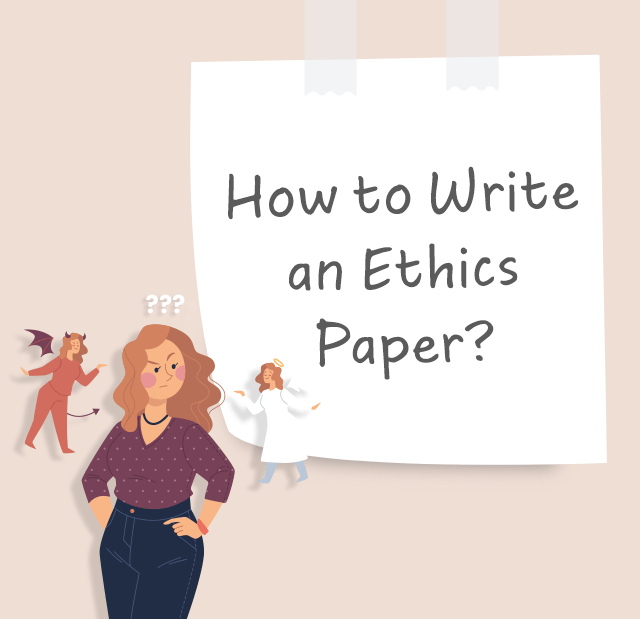
What is an Ethical Paper?
An ethics paper is a type of an argumentative assignment that deals with a certain ethical problem that a student has to describe and solve. Also, it can be an essay where a certain controversial event or concept is elaborated through an ethical lens (e.g. moral rules and principles), or a certain ethical dilemma is explained. Since ethics is connected to moral concepts and choices, a student needs to have a fair knowledge of philosophy and get ready to answer questions related to relationships, justice, professional and social duties, the origin of good and evil, etc., to write a quality paper. Also, writing an ethics paper implies that a student should process a great amount of information regarding their topic and analyze it according to paper terms.
General Aspects of Writing an Ethics Paper
Understanding the ethical papers’ features.
Every essay has differences and features that make it unique. Writing ethical papers implies that a student will use their knowledge of morality and philosophy to resolve a certain ethical dilemma or solve a situation. It can also be a paper in which a student needs to provide their reasoning on ethical or legal circumstances that follow a social issue. Finally, it can be an assignment in which an ethical concept and its application are described. On the contrary, a history essay deals with events that took place somewhen earlier, while a narrative essay is a paper where students demonstrate their storytelling skills, etc.
Defining What Type of Essay Should Be Written
Most of the time, ethical paper topics imply that a student will write an argumentative essay; however, ethics essays can also be descriptive and expository. Each of these essay types has different guidelines for writing, so be sure you know them before you start writing your papers on ethics. In case you missed this step in your ethical paper preparation stage, you would end up writing a paper that misses many important points.
Studying the Ethical Paper Guidelines
Once you get your ethical paper assignment, look through the guidelines that your instructor provided to you. If you receive them during the class, don’t hesitate to pose any questions immediately to remove any misunderstanding before writing an ethics paper outline, or ask for references that you need to use. When you are about to write your first draft, don’t rush: read the paper instructions once again to make sure you understand what is needed from you.
Paying Attention to the Paper Topic
The next thing you need to pay attention to is the ethical paper topic: once you are given one, make sure it falls into the scope of your educational course. After that, consider what additional knowledge may be needed to elaborate on your topic and think about what courses of your program could be helpful for it. Once you are done, read through your topic again to recheck whether you understand your assignment right.
Understanding the Notions of Ethical Arguments, Ethical and Legal Implications, and Ethical Dilemma
Last but not least, another important factor is that a student has to understand the basic terms of the assignment to write a high-quality paper. Ethical arguments are a set of moral rules that are used to defend your position on an ethical issue stated in your essay topic. We refer to ethical versus legal implications when we think about the compensation for certain ethical dilemma outcomes and whether it should be a moral punishment or legal judgment. An ethical dilemma itself refers to a problem or situation which makes an individual doubt what position to take: e.g, abortion, bribery, corruption, etc.
Writing Outline and Structure of an Ethics Paper
Every essay has a structure that makes it a solid piece of writing with straight reasoning and argumentation, and an ethics paper is not an exclusion. This paper has an introduction, body paragraphs, and conclusion. Below, we will describe how each part of ethical papers should be organized and what information they should contain.
First comes the introduction. It is the opening part of your paper which helps a reader to get familiar with your topic and understand what your paper will be about. Therefore, it should contain some information on your ethics paper topics and a thesis statement, which is a central statement of your paper.
The essay body is the most substantive part of your essay where all the reasoning and arguments should be presented. Each paragraph should contain an argument that supports or contradicts your thesis statement and pieces of evidence to support your position. Pick at least three arguments to make your position clear in your essay, and then your paper will be considered well-structured.
The third part of an ethics paper outline is a conclusion, which is a finishing essay part. Its goal is to wrap up the whole essay and make the author’s position clear for the last time. The thoughtful formulation in this essay part should be especially clear and concise to demonstrate the writer’s ability to make conclusions and persuade readers.
Also, don’t forget to include the works cited page after your writing. It should mention all the reference materials that you used in your paper in the order of appearance or in the alphabetical one. This page should be formatted according to the assigned formatting style. Most often, the most frequently used format for ethical papers is APA.
20 Examples of Ethical Paper Topics
- Are there any issues in the 21st century that we can consider immoral and why?
- What is corporate ethics?
- Why is being selfish no longer an issue in 2023?
- Euthanasia: pros and cons
- Marijuana legalization: should it be allowed all over the world?
- Is abortion an ethical issue nowadays?
- Can we invent a universal religion appropriate for all?
- Is the church necessary to pray to God?
- Can we forgive infidelity and should we do it?
- How to react if you are witnessing high school bullying?
- What are the ways to respond to a family abusing individual?
- How to demand your privacy protection in a digital world?
- The history of the American ethical thought
- Can war be ethical and what should the conflicting sides do to make it possible?
- Ethical issues of keeping a zoo in 2023
- Who is in charge of controlling the world’s population?
- How to achieve equality in the world’s rich and poor gap?
- Is science ethical?
- How ethical is genetic engineering?
- Why many countries refuse to go back to carrying out the death penalty?
Ethical Papers Examples
If you still have no idea about how to write an ethics paper, looking through other students’ successful examples is always a good idea. Below, you can find a relevant ethics paper example that you can skim through and see how to build your reasoning and argumentation in your own paper.
https://www.currentschoolnews.com/education-news/ethics-essay-examples/
https://sites.psu.edu/academy/2014/11/18/essay-2-personal-ethics-and-decision-making/
Ethical Papers Writing Tips
Choose a topic that falls into the ethics course program.
In case you were not given the ethics paper topic, consider choosing it yourself. To do that, brainstorm the ethical issues that fascinate you enough to do research. List all these issues on a paper sheet and then cross out those that are too broad or require expertise that you don’t have. The next step you need to take is to choose three or four ethical topics for papers from the list and try to do a quick search online to find out whether these topics are elaborated enough to find sources and reference materials on them. Last, choose one topic that you like the most and find the most relevant one in terms of available data for reference.
Do your research
Once the topic is chosen and organized, dive deeper into it to find the most credible, reliable, and trusted service. Use your university library, online scientific journals, documentaries, and other sources to get the information from. Remember to take notes while working with every new piece of reference material to not forget the ideas that you will base your argumentation on.
Follow the guidelines for a paper outline
During the preparation for your ethical paper and the process of writing it, remember to follow your professor’s instructions (e.g. font, size, spacing, citation style, etc.). If you neglect them, your grade for the paper will decrease significantly.
Write the essay body first
Do not rush to start writing your ethics papers from the very beginning; to write a good essay, you need to have your outline and thesis statement first. Then, go to writing body paragraphs to demonstrate your expertise on the issue you are writing about. Remember that one supporting idea should be covered in one paragraph and should be followed by the piece of evidence that confirms it.
Make sure your introduction and conclusion translate the same message
After your essay body is done, write a conclusion and an introduction for your paper. The main tip regarding these ethics paper parts is that you should make them interrelated: your conclusion has to restate your introduction but not repeat it. Also, a conclusion should wrap up your writing and make it credible for the audience.
Add citations
Every top-quality paper has the works cited page and citations to demonstrate that the research on the topic has been carried out. Therefore, do not omit this point when formatting your paper: add all the sources to the works cited page and pay attention to citing throughout the text. The latter should be done according to the formatting style indicated in your instructions.
Edit your paper
Last but not least is the editing and proofreading stage that you need to carry out before you submit your paper to your instructor. Consider keeping your first draft away from sight for a day or two to have a rest, and then go back to check it for errors and redundant phrases. Don’t rush to change anything immediately after finishing your writing since you are already tired and less focused, so some mistakes may be missed.
Writing Help by Handmadewriting
If you feel that you need help with writing an ethics paper in view of its chellnging nature, you can contact us and send an order through a respective button. You can add your paper details by following all steps of the order placing process that you will find on the website. Once your order is placed, we will get back to you as soon as possible. You will be able to contact your essay writer and let them know all your wishes regarding your ethical paper.
Our writers have expertise in writing ethical papers including, so you don’t need to worry about the quality of the essay that you will receive. Your assignment will be delivered on time and at a reasonable price. Note that urgent papers will cost slightly more than assignments with a postponed deadline, so do not wait too long to make your order. We will be glad to assist you with your writing and guarantee 24/7 support until you receive your paper.
Lastly, remember that no paper can be written overnight, so if you intend to complete your paper in a few hours, you can end up writing only a first draft with imperfections. If you have only half a day before your task is due, feel free to place an urgent order, and we will deliver it in just three hours.

A life lesson in Romeo and Juliet taught by death
Due to human nature, we draw conclusions only when life gives us a lesson since the experience of others is not so effective and powerful. Therefore, when analyzing and sorting out common problems we face, we may trace a parallel with well-known book characters or real historical figures. Moreover, we often compare our situations with […]

Ethical Research Paper Topics
Writing a research paper on ethics is not an easy task, especially if you do not possess excellent writing skills and do not like to contemplate controversial questions. But an ethics course is obligatory in all higher education institutions, and students have to look for a way out and be creative. When you find an […]

Art Research Paper Topics
Students obtaining degrees in fine art and art & design programs most commonly need to write a paper on art topics. However, this subject is becoming more popular in educational institutions for expanding students’ horizons. Thus, both groups of receivers of education: those who are into arts and those who only get acquainted with art […]
- PRO Courses Guides New Tech Help Pro Expert Videos About wikiHow Pro Upgrade Sign In
- EDIT Edit this Article
- EXPLORE Tech Help Pro About Us Random Article Quizzes Request a New Article Community Dashboard This Or That Game Popular Categories Arts and Entertainment Artwork Books Movies Computers and Electronics Computers Phone Skills Technology Hacks Health Men's Health Mental Health Women's Health Relationships Dating Love Relationship Issues Hobbies and Crafts Crafts Drawing Games Education & Communication Communication Skills Personal Development Studying Personal Care and Style Fashion Hair Care Personal Hygiene Youth Personal Care School Stuff Dating All Categories Arts and Entertainment Finance and Business Home and Garden Relationship Quizzes Cars & Other Vehicles Food and Entertaining Personal Care and Style Sports and Fitness Computers and Electronics Health Pets and Animals Travel Education & Communication Hobbies and Crafts Philosophy and Religion Work World Family Life Holidays and Traditions Relationships Youth
- Browse Articles
- Learn Something New
- Quizzes Hot
- This Or That Game
- Train Your Brain
- Explore More
- Support wikiHow
- About wikiHow
- Log in / Sign up
- Education and Communications
- College University and Postgraduate
- Academic Writing
How to Write an Ethics Paper
Last Updated: May 16, 2023 Approved
This article was co-authored by Emily Listmann, MA . Emily Listmann is a private tutor in San Carlos, California. She has worked as a Social Studies Teacher, Curriculum Coordinator, and an SAT Prep Teacher. She received her MA in Education from the Stanford Graduate School of Education in 2014. wikiHow marks an article as reader-approved once it receives enough positive feedback. In this case, 100% of readers who voted found the article helpful, earning it our reader-approved status. This article has been viewed 252,501 times.
Writing an ethics paper can present some unique challenges. For the most part, the paper will be written like any other essay or research paper, but there are some key differences. An ethics paper will generally require you to argue for a specific position rather than simply present an overview of an issue. Arguing this position will also involve presenting counterarguments and then refuting them. Finally, ensuring that your reasoning is valid and sound and citing the appropriate sources will allow you to write an ethics paper that will satisfy any critic.
Getting Started

- What is the main objective of the assignment?
- What specific things do you need to do in order to get a good grade?
- How much time will you need to complete the assignment?

- For example, you might begin with a topic of "ethical problems of euthanasia." This is very broad, and so forms a good starting point.

- Remember, you may refine your topic even further after you have begun writing your paper. This is perfectly acceptable, and is part of the advantage of writing a paper in multiple drafts.

- For example, you might include issues such as: "describing specifically what is meant by 'extreme, constant pain.' "Other issues might include, "the rights and responsibilities of physicians regarding euthanasia," and "voluntary versus involuntary euthanasia."
- After making this list, group or order them in some way. For example, you might imagine yourself taking the position that euthanasia is acceptable in this circumstance, and you could order the issues based on how you would draw supporting evidence and build your claim.
Developing Your Thesis Statement

- In your thesis, you should take a specific stand on the ethical issue. For example, you might write your thesis as follows: "Euthanasia is an immoral option even when patients are in constant, extreme pain."

- For example, this thesis statement is ambiguous: "Patients should not undergo euthanasia even when suffering constant, extreme pain." With how it's worded, it's unclear whether you mean that euthanasia should be outlawed or that it is morally wrong.
- Clarify your position to create a strong thesis: "Euthanasia is an immoral option even when patients are in constant, extreme pain."

- For example, in the thesis, "It is immoral for patients to choose euthanasia even when suffering constant, extreme pain," the moral burden is on the patient's actions. The author of this thesis would need to make sure to focus on the patient in the essay and not to focus on the moral implications of the doctor's actions.
- If the thesis you have written does not reflect what you want to argue in your paper, start over and draft a new thesis statement.
Conducting Research

- Ask a librarian for help finding sources if you are not sure how to access your library’s databases.
- A simple way to strengthen your argument through citations is by incorporating some relevant statistics. Simple statistics can have a major impact if presented after you've made a bold assertion. For instance, you may claim that the patient's family members would be unduly traumatized if the patient chose euthanasia, and then cite a university study that catalogued a majority of families reporting trauma or stress in this situation.
- Another helpful citation is one in which the broad issue itself is discussed. For instance, you might cite a prominent ethicist's position on your issue to strengthen your position.

- The author and his or her credentials. Does the source provide the author’s first and last name and credentials (M.D., Ph.D, etc.)? Steer clear of sources without an author attached to them or that lack credentials when credentials seem crucial, such as in an article about a medical subject. [3] X Research source
- Type of publication. Is the publication a book, journal, magazine, or website? Is the publisher an academic or educational institution? Does the publisher have a motive other than education? Who is the intended audience? Ask yourself these questions to determine if this source is reliable. For example, a university or government website might be reliable, but a site that sells items may be biased toward what they're selling.
- Citations. How well has the author researched his or her topic? Check the author’s bibliography or works cited page. If the author has not provided any sources, then you may want to look for a different source. [4] X Research source
- Bias. Has the author presented an objective, well-reasoned account of the topic? If the sources seems skewed towards one side of the argument, then it may not be a good choice. [5] X Research source
- Publication date. Does this source present the most up to date information on the subject? If the sources is outdated, then try to find something more recent. [6] X Research source

- To check for comprehension after reading a source, try to summarize the source in your own words and generate a response to the author’s main argument. If you cannot do one or both of these things, then you may need to read the source again.
- Creating notecards for your sources may also help you to organize your ideas. Write the citation for the source on the top of the notecard, then write a brief summary and response to the article in the lined area of the notecard. [7] X Research source

- Remember to indicate when you have quoted a source in your notes by putting it into quotation marks and including information about the source such as the author’s name, article or book title, and page number. [8] X Research source
Writing and Revising Your Ethics Paper

- To expand on your outline, write a couple of sentences describing and/or explaining each of the items in your outline. Include a relevant source for each item as well.

- Check your outline to see if you have covered each of these items in this order. If not, you will need to add a section and use your sources to help inform that section.

- In your first draft, focus on the quality of the argument, rather than the quality of the prose. If the argument is structured well and each conclusion is supported by your reasoning and by cited evidence, you will be able to focus on the writing itself on the second draft.
- Unless major revisions are needed to your argument (for example, if you have decided to change your thesis statement), use the second draft to strengthen your writing. Focus on sentence lengths and structures, vocabulary, and other aspects of the prose itself.

- Try to allow yourself a few days or even a week to revise your paper before it is due. If you do not allow yourself enough time to revise, then you will be more prone to making simple mistakes and your grade may suffer as a result. [10] X Research source

- Does my paper fulfill the requirements of the assignment? How might it score according to the rubric provided by my instructor?
- What is your main point? How might you clarify your main point?
- Who is your audience? Have you considered their needs and expectations?
- What is your purpose? Have you accomplished your purpose with this paper?
- How effective is your evidence? How might your strengthen your evidence?
- Does every part of your paper relate back to your thesis? How might you improve these connections?
- Is anything confusing about your language or organization? How might your clarify your language or organization?
- Have you made any errors with grammar, punctuation, or spelling? How can you correct these errors?
- What might someone who disagrees with you say about your paper? How can you address these opposing arguments in your paper? [11] X Research source

- As you read your paper out loud, highlight or circle any errors and revise as necessary before printing your final copy.
Community Q&A
- If at all possible, have someone else read through your paper before submitting it. They can provide valuable feedback on style as well as catching grammatical errors. Thanks Helpful 0 Not Helpful 1

Things You'll Need
- Word-processing software
- Access to your library’s databases
- Pencil and highlighter
You Might Also Like

- ↑ https://owl.english.purdue.edu/owl/resource/688/1/
- ↑ https://owl.english.purdue.edu/owl/resource/553/03/
- ↑ http://guides.jwcc.edu/content.php?pid=65900&sid=538553
- ↑ http://www.writing.utoronto.ca/advice/reading-and-researching/notes-from-research
- ↑ https://owl.english.purdue.edu/owl/resource/658/05/
- ↑ https://owl.english.purdue.edu/owl/resource/561/05/
About This Article

To write an ethics paper, start by researching the issue you want to write about and evaluating your sources for potential bias and trustworthiness. Next, develop a thesis statement that takes a specific stand on the issue and create an outline that includes the key arguments. As you write, avoid using words like “could” or “might,” which will seem ambiguous to the reader. Once you’ve finished your paper, take a break for a few days so your mind is clear, then go back and revise what you wrote, focusing on the quality of your argument. For tips from our Education reviewer on how to annotate source material as you research, read on! Did this summary help you? Yes No
- Send fan mail to authors
Reader Success Stories
Kristal Okeke
Apr 3, 2017
Did this article help you?
Tumelo Ratladi
Aug 9, 2016
Timela Crutcher
Dec 11, 2016
Aug 29, 2016
Jimm Hopper
Apr 18, 2018

Featured Articles

Trending Articles

Watch Articles

- Terms of Use
- Privacy Policy
- Do Not Sell or Share My Info
- Not Selling Info
wikiHow Tech Help Pro:
Develop the tech skills you need for work and life
You are using an outdated browser. Please upgrade your browser to improve your experience.

Health & Nursing
Courses and certificates.
- Bachelor's Degrees
- View all Business Bachelor's Degrees
- Business Management – B.S. Business Administration
- Healthcare Administration – B.S.
- Human Resource Management – B.S. Business Administration
- Information Technology Management – B.S. Business Administration
- Marketing – B.S. Business Administration
- Accounting – B.S. Business Administration
- Finance – B.S.
- Supply Chain and Operations Management – B.S.
- Accelerated Information Technology Bachelor's and Master's Degree (from the School of Technology)
- Health Information Management – B.S. (from the Leavitt School of Health)
Master's Degrees
- View all Business Master's Degrees
- Master of Business Administration (MBA)
- MBA Information Technology Management
- MBA Healthcare Management
- Management and Leadership – M.S.
- Accounting – M.S.
- Marketing – M.S.
- Human Resource Management – M.S.
- Master of Healthcare Administration (from the Leavitt School of Health)
- Data Analytics – M.S. (from the School of Technology)
- Information Technology Management – M.S. (from the School of Technology)
- Education Technology and Instructional Design – M.Ed. (from the School of Education)
Certificates
- Supply Chain
- Accounting Fundamentals
- View all Business Degrees
Bachelor's Preparing For Licensure
- View all Education Bachelor's Degrees
- Elementary Education – B.A.
- Special Education and Elementary Education (Dual Licensure) – B.A.
- Special Education (Mild-to-Moderate) – B.A.
- Mathematics Education (Middle Grades) – B.S.
- Mathematics Education (Secondary)– B.S.
- Science Education (Middle Grades) – B.S.
- Science Education (Secondary Chemistry) – B.S.
- Science Education (Secondary Physics) – B.S.
- Science Education (Secondary Biological Sciences) – B.S.
- Science Education (Secondary Earth Science)– B.S.
- View all Education Degrees
Bachelor of Arts in Education Degrees
- Educational Studies – B.A.
Master of Science in Education Degrees
- View all Education Master's Degrees
- Curriculum and Instruction – M.S.
- Educational Leadership – M.S.
- Education Technology and Instructional Design – M.Ed.
Master's Preparing for Licensure
- Teaching, Elementary Education – M.A.
- Teaching, English Education (Secondary) – M.A.
- Teaching, Mathematics Education (Middle Grades) – M.A.
- Teaching, Mathematics Education (Secondary) – M.A.
- Teaching, Science Education (Secondary) – M.A.
- Teaching, Special Education (K-12) – M.A.
Licensure Information
- State Teaching Licensure Information
Master's Degrees for Teachers
- Mathematics Education (K-6) – M.A.
- Mathematics Education (Middle Grade) – M.A.
- Mathematics Education (Secondary) – M.A.
- English Language Learning (PreK-12) – M.A.
- Endorsement Preparation Program, English Language Learning (PreK-12)
- Science Education (Middle Grades) – M.A.
- Science Education (Secondary Chemistry) – M.A.
- Science Education (Secondary Physics) – M.A.
- Science Education (Secondary Biological Sciences) – M.A.
- Science Education (Secondary Earth Science)– M.A.
- View all Technology Bachelor's Degrees
- Cloud Computing – B.S.
- Computer Science – B.S.
- Cybersecurity and Information Assurance – B.S.
- Data Analytics – B.S.
- Information Technology – B.S.
- Network Engineering and Security – B.S.
- Software Engineering – B.S.
- Accelerated Information Technology Bachelor's and Master's Degree
- Information Technology Management – B.S. Business Administration (from the School of Business)
- View all Technology Master's Degrees
- Cybersecurity and Information Assurance – M.S.
- Data Analytics – M.S.
- Information Technology Management – M.S.
- MBA Information Technology Management (from the School of Business)
- Full Stack Engineering
- Web Application Deployment and Support
- Front End Web Development
- Back End Web Development
3rd Party Certifications
- IT Certifications Included in WGU Degrees
- View all Technology Degrees
- View all Health & Nursing Bachelor's Degrees
- Nursing (RN-to-BSN online) – B.S.
- Nursing (Prelicensure) – B.S. (Available in select states)
- Health Information Management – B.S.
- Health and Human Services – B.S.
- Psychology – B.S.
- Health Science – B.S.
- Healthcare Administration – B.S. (from the School of Business)
- View all Nursing Post-Master's Certificates
- Nursing Education—Post-Master's Certificate
- Nursing Leadership and Management—Post-Master's Certificate
- Family Nurse Practitioner—Post-Master's Certificate
- Psychiatric Mental Health Nurse Practitioner —Post-Master's Certificate
- View all Health & Nursing Degrees
- View all Nursing & Health Master's Degrees
- Nursing – Education (BSN-to-MSN Program) – M.S.
- Nursing – Leadership and Management (BSN-to-MSN Program) – M.S.
- Nursing – Nursing Informatics (BSN-to-MSN Program) – M.S.
- Nursing – Family Nurse Practitioner (BSN-to-MSN Program) – M.S. (Available in select states)
- Nursing – Psychiatric Mental Health Nurse Practitioner (BSN-to-MSN Program) – M.S. (Available in select states)
- Nursing – Education (RN-to-MSN Program) – M.S.
- Nursing – Leadership and Management (RN-to-MSN Program) – M.S.
- Nursing – Nursing Informatics (RN-to-MSN Program) – M.S.
- Master of Healthcare Administration
- MBA Healthcare Management (from the School of Business)
- Business Leadership (with the School of Business)
- Supply Chain (with the School of Business)
- Accounting Fundamentals (with the School of Business)
- Back End Web Development (with the School of Technology)
- Front End Web Development (with the School of Technology)
- Web Application Deployment and Support (with the School of Technology)
- Full Stack Engineering (with the School of Technology)
- Single Courses
- Course Bundles
Apply for Admission
Admission requirements.
- New Students
- WGU Returning Graduates
- WGU Readmission
- Enrollment Checklist
- Accessibility
- Accommodation Request
- School of Education Admission Requirements
- School of Business Admission Requirements
- School of Technology Admission Requirements
- Leavitt School of Health Admission Requirements
Additional Requirements
- Computer Requirements
- No Standardized Testing
- Clinical and Student Teaching Information
Transferring
- FAQs about Transferring
- Transfer to WGU
- Transferrable Certifications
- Request WGU Transcripts
- International Transfer Credit
- Tuition and Fees
- Financial Aid
- Scholarships

Other Ways to Pay for School
- Tuition—School of Business
- Tuition—School of Education
- Tuition—School of Technology
- Tuition—Leavitt School of Health
- Your Financial Obligations
- Tuition Comparison
- Applying for Financial Aid
- State Grants
- Consumer Information Guide
- Responsible Borrowing Initiative
- Higher Education Relief Fund
FAFSA Support
- Net Price Calculator
- FAFSA Simplification
- See All Scholarships
- Military Scholarships
- State Scholarships
- Scholarship FAQs
Payment Options
- Payment Plans
- Corporate Reimbursement
- Current Student Hardship Assistance
- Military Tuition Assistance
WGU Experience
- How You'll Learn
- Scheduling/Assessments
- Accreditation
- Student Support/Faculty
- Military Students
- Part-Time Options
- Virtual Military Education Resource Center
- Student Outcomes
- Return on Investment
- Students and Gradutes
- Career Growth
- Student Resources
- Communities
- Testimonials
- Career Guides
- Skills Guides
- Online Degrees
- All Degrees
- Explore Your Options
Admissions & Transfers
- Admissions Overview
Tuition & Financial Aid
- Student Success
- Prospective Students
- Current Students
- Military and Veterans
- Commencement
- Careers at WGU
- Advancement & Giving
- Partnering with WGU
How to Write a Personal Ethics Statement—And Why Every Professional Should
- Career Development
- See More Tags

What is a Personal Ethics Statement?
Personal ethics are your guidelines for forming relationships, overcoming challenges, and decision- making. A personal ethics statement is a one-page essay that gives a picture of your core values and what potential supervisors, colleagues, or clients can expect from working with you. It can be useful when you’re applying for school , just starting out in your career, looking for a new job, trying to expand your client base, or advancing your career.
In this article we will discuss personal ethics—which should not be mistaken for professional ethics. Personal ethics relate to the values you hold in personal relationships and daily life, an whereas professional ethics relate to how you conduct yourself in business settings, deals, and professional relationships.
An important part of your personal ethics statement is identifying your personal beliefs and personal values. Some code of ethics examples include integrity, selflessness, honesty, loyalty, equality, fairness, empathy, respect, and self-respect. This article is a complete resource for forming your personal ethics and transforming them into a compelling personal ethics statement.
Professional Impacts of Personal Ethics
There are many occasions your personal ethics will play a role in your behavior in professional settings. No matter your line of work, it’s important that you maintain unshakable personal ethics in your professional relationships and how you interact in the workplace.
Business Ethics
Business ethics are the practices and policies put into place to ensure people and resources are treated ethically in business dealings. While you’re making decisions in business to benefit a company, you must consider the impact of those decisions on others. Developing your personal code of conduct will help support you in upholding your company policies in the workplace, which will help you maintain personal integrity, as well as avoid potential business scandals . Learn about how to be an ethical leader in a business setting.
With a career in information technology, part of your job involves having access to private or confidential information. Your moral compass plays a significant role in keeping this type of information safe, especially since cyber-attacks—which happen every 39 seconds on average—are so prevalent in modern society. Having a career in IT immerses you in the world of cyber security , where ethical behavior and policy adherence are essential.
Healthcare Ethics
In the healthcare field, you’re responsible for human lives, so it’s no wonder that strong professional competence and integrity are important in how you carry yourself at work. There are plenty of complex issues, regulations, and compliance policies that you’ll encounter in a hospital or care facility, which demands that you seek the guidance of your personal ethics.
Teaching Ethics
Strong moral values are a necessary component of being a teacher. When your job is to sculpt young minds, you have must take responsibility for setting a strong example for them. Part of this is keeping students safe, part of this is treating all students equally and without discrimination. Part of this is creating healthy boundaries between your students and your personal life . If you build a personal ethics statement, you have a north star to look towards in this professional setting as you encounter ethical dilemmas. If you’re planning to become a teacher, you should also consider writing a teaching philosophy statement.

How Do I Write a Personal Ethics Statement?
There are five essential steps to writing—and perfecting—your personal ethics statement:
1. Know your audience.
The first step to writing an effective personal ethics statement is knowing and understanding the audience you’re writing for. This one-page piece of writing is supposed to influence the reader, so keeping the motivations and sentiments of your audience in mind while writing is important to completing your goal. Once you know your audience, whether it be an admissions counselor or a potential employer, then you can choose words and reference practices and policies that resonate with them and meet any guidelines in place.
2. Choose your goals.
There are two important types of goals to think about when building your personal ethics statement: your short-term and long-term goals. For example, your short-term goal may be getting into college, while your long-term goal is becoming a software engineer. Once you identify these, then you can phrase your personal ethics in terms of how they relate to your desired career path. To build off the previous example, if you aspire to be a software engineer, you can talk about personal ethics that relate to cyber security or the hard work required to get to your desired goal.
3. Determine your influences.
What influences the decisions you make? This is an essential step in determining your code of ethics because every choice you make is influenced by internal and external factors. One factor that affects everyone is personal traits. Your personality plays a crucial role in the decisions you make and how you carry yourself with others. Another factor is the people in your life who have helped in shaping who you are today. A third example is momentous events. Everyone experiences wonderful, pivotal moments in their life, as well as tragic and traumatic moments. All these factors play a role in your personal ethics, and they should be included in your personal ethics statement.
4. Identify your beliefs and practices.
This step is about writing down examples of how you move through the world and the core beliefs you live by. Compelling stories elicit emotional reactions from your audience and prove that you put your personal ethics into daily practice. Examples are essential to creating a strong personal ethics statement.
5. Name your “why.”
Why did you choose the ethical principles that you did? Confidently answering this question and providing details is essential to the authenticity of the statement. Decide why your personal ethics are important to you, how your life experiences brought you to those ethics, and how you’ll continue to keep them at the center of your decisions going forward. This step is important to making sure your audience walks away with a clear understanding of what ethical standards are important to you and why.
What Should I Include in a Personal Ethics Statement?
Your personal ethics statement should consist of an introduction, a body, and a conclusion.
Start your personal ethics statement with a one- to two-paragraph introduction. Use the introduction to talk about the life experiences that helped form your ethical background. Maybe you had a major injury in your childhood that resulted in lifelong ability differences, and this made you an advocate for accessibility. Find a personal story that will engage your reader and provide a foundation for your statement.
In the body of your personal ethics statement—about two or three paragraphs—you should list each of the ethical principles that are central in your life. This is your opportunity to make sure the reader knows your core beliefs. If you have a personal mantra, include it here. In this section, true life examples are your friend.
What Should I not Include in a Personal Ethics Statement?
Since a personal ethics statement is a deeply personal piece of writing, it’s important to be honest and authentic. The last thing you want to do is include fake life experiences just to make a point. This also isn’t an opportunity to profess all your life’s mistakes. You are human and your personal ethics statement should reflect that, but in a positive and inspiring light.
How to Conclude
Every personal ethics statement should have a strong conclusion. Sum it all up in a final paragraph where you explain how your core values make you a great person to have in a professional organization or an excellent candidate for an academic program.
Ready to Start Your Journey?
HEALTH & NURSING
Recommended Articles
Take a look at other articles from WGU. Our articles feature information on a wide variety of subjects, written with the help of subject matter experts and researchers who are well-versed in their industries. This allows us to provide articles with interesting, relevant, and accurate information.
{{item.date}}
{{item.preTitleTag}}
{{item.title}}
The university, for students.
- Student Portal
- Alumni Services
Most Visited Links
- Business Programs
- Student Experience
- Diversity, Equity, and Inclusion
- Student Communities
- Putting ethics at the centre of everyday life.
- LIVING OUR ETHICS
- ANNUAL REPORTS
- Articles, podcasts, videos, research & courses tackling the issues that matter.
WHAT IS ETHICS?
- Events and interactive experiences exploring ethics of being human.
- UPCOMING EVENTS
- PAST EVENTS
- PAST SPEAKERS
- FESTIVAL OF DANGEROUS IDEAS
- Counselling and bespoke consulting programs to help you make better decisions and navigate complexity.
- CONSULTING & LEADERSHIP
- Our work is only made possible because of you. Join us!
- BECOME A MEMBER
- SUPPORT OUR WORK
- THE ETHICS ALLIANCE
- BANKING + FINANCIAL SERVICES OATH
- RESIDENCY PROGRAM 2024
- YOUNG WRITERS’ COMPETITION
- YOUTH ADVISORY COUNCIL
- ENGAGE AN EXPERT
- MEDIA CENTRE
- HIRE OUR SPACE
WHAT IS ETHICS
Part of what makes humans unique is our freedom to determine how we’ll act..
Whenever we make a choice, it was possible for us to have made a different one. The Danish philosopher Soren Kierkegaard captures this sense when he describes standing on the edge of a cliff. The only thing that prevents us from falling into the void is us – our choice to do otherwise.
Ethics is only possible because we can act against our nature, based on our conscience. It stops us from simply describing what is likely to happen, and allows us to make judgements about what should happen. Of all the ways you might act, which is the best? Of all the possibilities, which one should you bring into reality? That’s the question ethics seeks to answer.
Of course you can only answer that question if you dare to ask it. It’s comfortable, safe and pretty common to do what’s always been done – pass responsibility onto others or stick with the status quo. Ethics asks us to take responsibility for our beliefs and our actions, and live a life that’s our own.
How do you decide?
Ethics isn’t the only way to define what the ‘best’ decision might look like. Some might see it as the one that advances their own goals and interests, or makes the most money. Others may focus on what’s likely to be the most popular choice.
At the heart of these is a nugget of ethics, but each is a distraction from the questions that matter most. Ethics defines the best option as the one which best achieves what is good, right and consistent with the nature of the things in question. At The Ethics Centre, we refer to these as ‘values’, ‘principles’ and ‘purpose’.
- Values tell us what’s good – they’re the things we strive for, desire and seek to protect.
- Principles tell us what’s right – outlining how we may or may not achieve our values.
- Purpose is your reason for being – it gives life to your values and principles.
Ethics is the process of questioning, discovering and defending our values, principles and purpose. It’s about finding out who we are and staying true to that in the face of temptations, challenges and uncertainty. It’s not always fun and it’s hardly ever easy, but if we commit to it, we set ourselves up to make decisions we can stand by, building a life that’s truly our own and a future we want to be a part of.
Questions to guide you.
There is no ready-made way to deal with ethical challenges. They require us to respond to specific circumstances and relationships as well as the various ethical considerations – purpose, values and principles – at play.
Still, there are a few questions you can ask that can help crystalise the ethical issues for you.
1. Would I be happy for this decision to be headlining the news tomorrow?
This is known as the Sunlight Test. Imagine if your decision – and the reasons you made it – were public knowledge. What if the people you most admire knew what you’d done and why? Do you think you’d be able to defend yourself? Would other people agree, or at least understand, why you did what you did? Note – it’s the ‘don’t be ashamed’ test not the ‘don’t get caught’ test.
2. Is there an ethical non-negotiable at play?
Is there a rule that any reasonable person should apply to this situation regardless of the consequences? Some rules are unbreakable, even when the stakes are high. For instance, we should never act in ways that undermine the equality and dignity of all people – ourselves included. The rules are often associated with duties – some of which we create ourselves, like when we make a promise.
3. Will my action make the world a better place?
We often think about ethics in terms of consequences. ‘The greatest good for the greatest number’ is a maxim many people recognise and accept. Consequences are an important part of ethical decisions, but are they everything?
We should be aware of what we’re sacrificing when trying to bring about good consequences. Are we violating an important principle? Are we compromising our own values? If so, have we considered these facts when balancing harms and benefits?
4. What would happen if everybody did this?
Would you be happy if your reason for action was used by everyone in the same circumstance? If not, then what makes you so special? Most ethical frameworks suggest the right decision for one person should be right for everybody in the same position. A lot of unethical behaviour arises from people making special exceptions for themselves. This test helps us be sure we’re willing to hold ourselves to the same standards we hold others to.
5. What will this do to my character or the character of my organisation?
Many people believe that our decisions shape our character and vice versa. That is, we can’t lie and cheat without becoming a fraudulent liar. For instance, if we’re a liar we’ll tend to lie more often.
Think about whether your action is establishing a habit either for you or your organisation. Is it a good habit (virtue) or a bad one (vice)? If I cut corners on a work job today am I developing a habit of laziness that may affect my future work?
6. Is this consistent with my values and principles?
Plenty of people and organisations are happy to tell you what they stand for – but do they walk the talk? Are my actions reflecting my ethical beliefs? Most ethical systems have no time for hypocrisy.
Answering these questions doesn’t guarantee everyone will accept our decision. Moral disagreement is extremely common. But even the answer to our question doesn’t achieve universal approval, the way in which we reach those answers matters. Ethics allows us to explore these questions in a way that is sincere, rational, competent and honest.
You may also be interested in...

Consequentialism

Ethics Explainer: Existentialism

Ethics Explainer: Stoicism

Ethics and Morality
Morality, Ethics, Evil, Greed
Reviewed by Psychology Today Staff
To put it simply, ethics represents the moral code that guides a person’s choices and behaviors throughout their life. The idea of a moral code extends beyond the individual to include what is determined to be right, and wrong, for a community or society at large.
Ethics is concerned with rights, responsibilities, use of language, what it means to live an ethical life, and how people make moral decisions. We may think of moralizing as an intellectual exercise, but more frequently it's an attempt to make sense of our gut instincts and reactions. It's a subjective concept, and many people have strong and stubborn beliefs about what's right and wrong that can place them in direct contrast to the moral beliefs of others. Yet even though morals may vary from person to person, religion to religion, and culture to culture, many have been found to be universal, stemming from basic human emotions.
- The Science of Being Virtuous
- Understanding Amorality
- The Stages of Moral Development
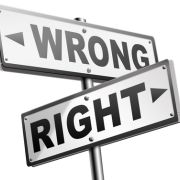
Those who are considered morally good are said to be virtuous, holding themselves to high ethical standards, while those viewed as morally bad are thought of as wicked, sinful, or even criminal. Morality was a key concern of Aristotle, who first studied questions such as “What is moral responsibility?” and “What does it take for a human being to be virtuous?”
We used to think that people are born with a blank slate, but research has shown that people have an innate sense of morality . Of course, parents and the greater society can certainly nurture and develop morality and ethics in children.
Humans are ethical and moral regardless of religion and God. People are not fundamentally good nor are they fundamentally evil. However, a Pew study found that atheists are much less likely than theists to believe that there are "absolute standards of right and wrong." In effect, atheism does not undermine morality, but the atheist’s conception of morality may depart from that of the traditional theist.
Animals are like humans—and humans are animals, after all. Many studies have been conducted across animal species, and more than 90 percent of their behavior is what can be identified as “prosocial” or positive. Plus, you won’t find mass warfare in animals as you do in humans. Hence, in a way, you can say that animals are more moral than humans.
The examination of moral psychology involves the study of moral philosophy but the field is more concerned with how a person comes to make a right or wrong decision, rather than what sort of decisions he or she should have made. Character, reasoning, responsibility, and altruism , among other areas, also come into play, as does the development of morality.

The seven deadly sins were first enumerated in the sixth century by Pope Gregory I, and represent the sweep of immoral behavior. Also known as the cardinal sins or seven deadly vices, they are vanity, jealousy , anger , laziness, greed, gluttony, and lust. People who demonstrate these immoral behaviors are often said to be flawed in character. Some modern thinkers suggest that virtue often disguises a hidden vice; it just depends on where we tip the scale .
An amoral person has no sense of, or care for, what is right or wrong. There is no regard for either morality or immorality. Conversely, an immoral person knows the difference, yet he does the wrong thing, regardless. The amoral politician, for example, has no conscience and makes choices based on his own personal needs; he is oblivious to whether his actions are right or wrong.
One could argue that the actions of Wells Fargo, for example, were amoral if the bank had no sense of right or wrong. In the 2016 fraud scandal, the bank created fraudulent savings and checking accounts for millions of clients, unbeknownst to them. Of course, if the bank knew what it was doing all along, then the scandal would be labeled immoral.
Everyone tells white lies to a degree, and often the lie is done for the greater good. But the idea that a small percentage of people tell the lion’s share of lies is the Pareto principle, the law of the vital few. It is 20 percent of the population that accounts for 80 percent of a behavior.
We do know what is right from wrong . If you harm and injure another person, that is wrong. However, what is right for one person, may well be wrong for another. A good example of this dichotomy is the religious conservative who thinks that a woman’s right to her body is morally wrong. In this case, one’s ethics are based on one’s values; and the moral divide between values can be vast.

Psychologist Lawrence Kohlberg established his stages of moral development in 1958. This framework has led to current research into moral psychology. Kohlberg's work addresses the process of how we think of right and wrong and is based on Jean Piaget's theory of moral judgment for children. His stages include pre-conventional, conventional, post-conventional, and what we learn in one stage is integrated into the subsequent stages.
The pre-conventional stage is driven by obedience and punishment . This is a child's view of what is right or wrong. Examples of this thinking: “I hit my brother and I received a time-out.” “How can I avoid punishment?” “What's in it for me?”
The conventional stage is when we accept societal views on rights and wrongs. In this stage people follow rules with a good boy and nice girl orientation. An example of this thinking: “Do it for me.” This stage also includes law-and-order morality: “Do your duty.”
The post-conventional stage is more abstract: “Your right and wrong is not my right and wrong.” This stage goes beyond social norms and an individual develops his own moral compass, sticking to personal principles of what is ethical or not.

Why Michael Cohen is apologizing and atoning for his mistakes in the New York Supreme Court case against Donald J. Trump.

A Personal Perspective: When we choose which ideas should be given the right of freedom of expression and which shouldn't, democracy suffers for all of us.

However well-intended, our empathy and support can have a paradoxical effect. We can fail to take others seriously or appreciate their suffering as a response to moral demands.

Personal Perspective: Life can be more than continually grabbing as much as we can for ourselves. Let's fight back with courtesy and respect the needs of others.

As a father of an autistic child and a researcher on neurodiversity, I propose we model political interactions after productive relationships with neurodivergent family members.

Debt is incredibly common, yet we often do not discuss its impact. Moralizing debt can create isolation and shameful feelings.

Recognizing our shared humanity can counter injustice and harm and help bring peace to our hearts.

A client is getting on your nerves. You feel it’s not good for your mental health to continue to work with them. How can you terminate work without incurring a malpractice lawsuit?

Accountability is the virtue of answerability. It involves trust, but not blind trust. It claims both successes and failures. In sports, it makes us hard to beat.

Let's say you don’t think it’s good for your mental health to continue working with a particular client. How can you terminate work without being sued for malpractice?
- Find a Therapist
- Find a Treatment Center
- Find a Psychiatrist
- Find a Support Group
- Find Online Therapy
- United States
- Brooklyn, NY
- Chicago, IL
- Houston, TX
- Los Angeles, CA
- New York, NY
- Portland, OR
- San Diego, CA
- San Francisco, CA
- Seattle, WA
- Washington, DC
- Asperger's
- Bipolar Disorder
- Chronic Pain
- Eating Disorders
- Passive Aggression
- Personality
- Goal Setting
- Positive Psychology
- Stopping Smoking
- Low Sexual Desire
- Relationships
- Child Development
- Self Tests NEW
- Therapy Center
- Diagnosis Dictionary
- Types of Therapy

At any moment, someone’s aggravating behavior or our own bad luck can set us off on an emotional spiral that threatens to derail our entire day. Here’s how we can face our triggers with less reactivity so that we can get on with our lives.
- Emotional Intelligence
- Gaslighting
- Affective Forecasting
- Neuroscience
180 Ethics Topics & Ethical Questions to Debate
Our code of ethics is derived from what we think is right or wrong. On top of that, we have to agree to the moral standards established by the society we live in. Conventional norms generally label theft, murder, or harassment as bad. However, there are many influences that impact our considerations and understanding of ethics.
Ethics is a branch of philosophy that studies moral issues. This article outlines the three different types of ethics and presents a list of compelling ethics topics for essays and research papers, as well as ethical questions to debate.
You don’t know how to write about ethics or which ethical argument topic to choose for your paper? Maybe your assignment deadline is dreadfully looming over you? Our custom writing service is happy to help you craft a fantastic essay on ethics whenever the need arises.
🔝 Top 10 Ethical Topics
- 🧑🤝🧑Types of Ethics
- 🤔 Ethical Issues
- 🖥️ Computer Ethics
- 🧬 Bioethics
- 🚓👮 Criminal Justice
- ⚖️ Ethical Dilemmas
⭐ Top 10 Ethics Topics to Debate
😈 ethical questions to debate, 🔍 references.
- Religious beliefs vs. medical care
- Issues behind unpaid internships
- Toxic environment at the workplace
- The dilemma of reporting an accident
- Should one’s political leanings be private?
- The limits of doctor-patient confidentiality
- Is it ethical to pay children for good grades?
- Ethics at the workplace and discrimination
- Should social media be allowed at the workplace?
- Promotion of environmental responsibility in business
🧑🤝🧑 Types of Ethics
Modern philosophy splits ethics into three groups: metaethics, normative ethics, and applied ethics.
- The core question of metaethics is: “What is morality, and where does it come from?” It is also concerned with the emergence of human values, motivation, and reasoning.
- Normative ethics seeks to answer the question, “How should I act?” An example of a normative moral theory is Kant’s Categorical Imperative: Act only according to that maxim whereby you can, at the same time, will that it should become a universal law . In other words: be kind.
- Applied ethics seeks to apply moral considerations into real-life controversial subjects. Its contents can vary greatly and touch bioethics as well as criminal justice. It studies specific actions and practices from the point of moral acceptance.
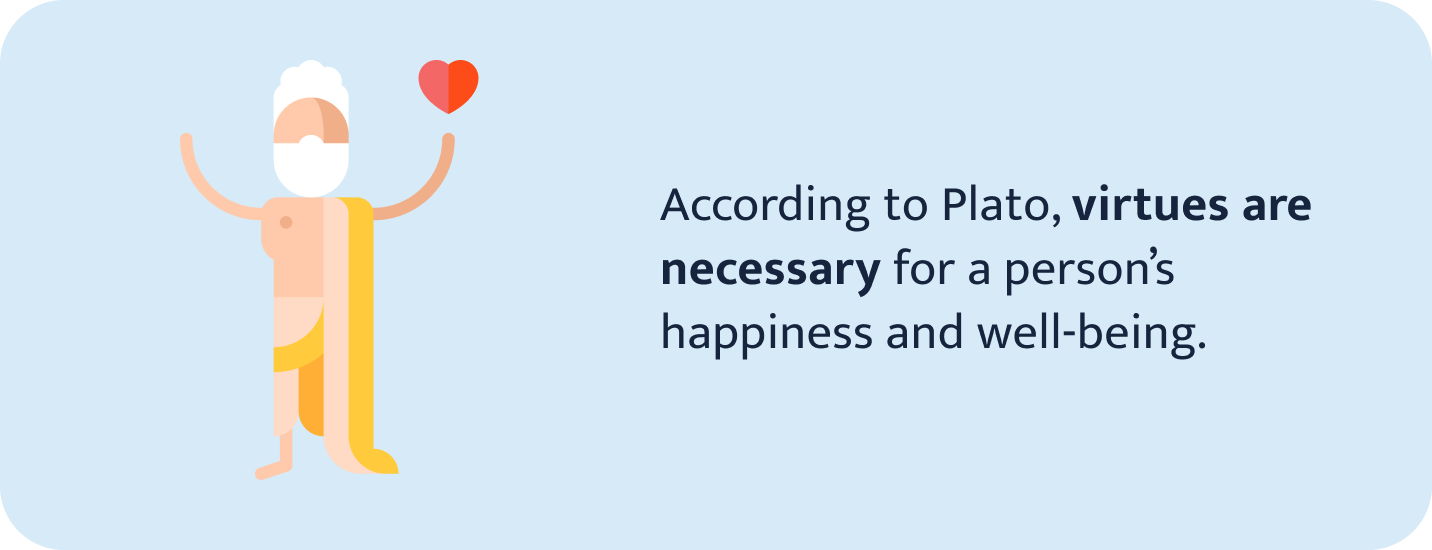
However, ethics does not end with these three types. Over the centuries, philosophers have proposed various ethical theories. Their four general categories are deontological, utilitarian, right, and virtue ethics.
- A deontologist is a person with a set of moral duties from which they will not adhere. When faced with an ethical conflict, they will always act according to their self-proclaimed obligations.
- For a utilitarian , a decision needs to yield the greatest benefit for the majority.
- If rights are the root of an ethical theory, these are the highest priority. A person’s rights can either be established in a society by law or bestowed from one individual upon another.
- Judging someone by virtue means considering a person’s character rather than their actions. Here, an individual’s reputation, motivation, and ethics play a crucial role.
Now that you know the basics, you have the perfect ground to start your ethics essay.
🤔 Ethical Topics for an Essay
Ethical issues are situations in which an individual needs to evaluate which course of action is morally right. Essays on this topic shine a light on difficult questions. Therefore, students need to defend their position convincingly.
- Discuss what we should do about climate change.
- What are the moral problems surrounding abortion?
- Can we still justify eating meat?
- Investigate the use of plastic in the beauty industry.
- Is it unethical to be extremely rich?
- Should you buy Nestlé products despite the fact that the company privatizes water?
- Is the unequal distribution of wealth unethical?
- Discuss how workplace ethics should take sexism into account.
- What can we do to combat racism?
- Why are LGBT+ people discriminated against?
- Should euthanasia be legal?
- Can war be ethical?
- Should schools punish students for attending the Fridays for Future protests?
- Would drug use be unethical if it were legal?
- Explain the moral problems that come with automating jobs.
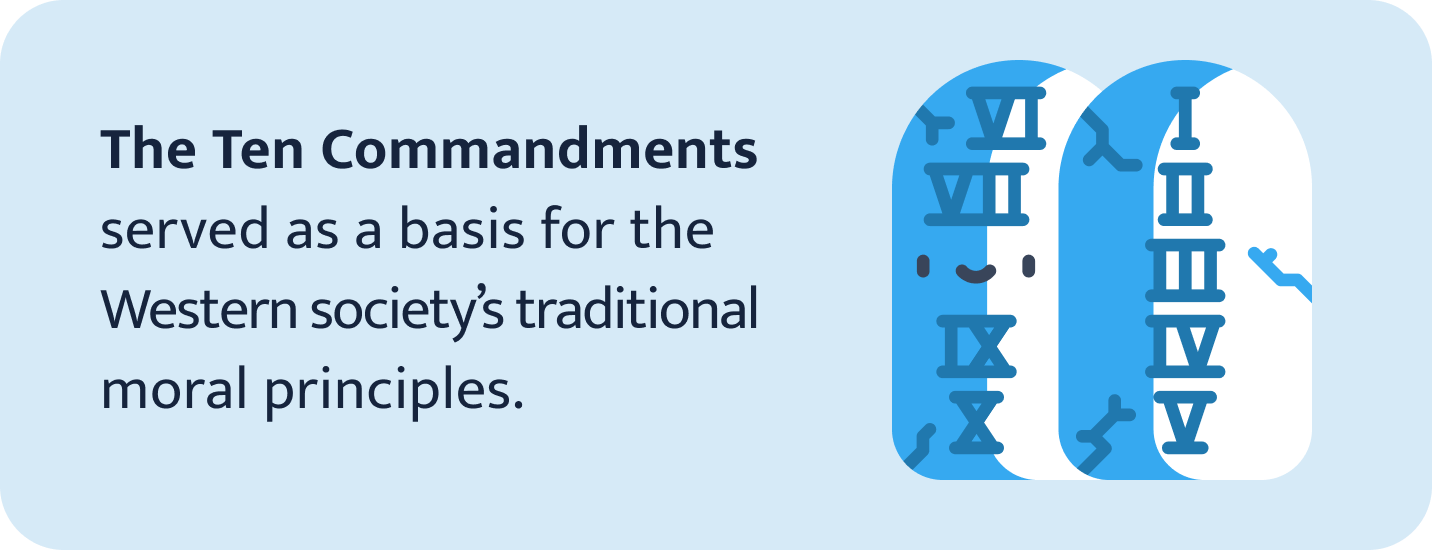
- Is it ethical to hire someone to do assignments for you?
- How far should everyone’s right to privacy go?
- Is using animals for scientific testing unethical?
- How should governments deal with refugees ?
- Discuss the carbon impact of having children.
- Can modern societies still be held accountable for what their nation did in the past?
- Analyze the benefits and disadvantages of universal income.
- How much control should the state have on the press?
- Should schools teach religion?
- What are ethical concerns regarding downloading media from the internet?
🖥️ Computer Ethics Essay Topics
The advent of information technology has altered every aspect of our lives. Computer ethics applies traditional moral theories to everything surrounding computers and cyber security. The list below contains enthralling ethical topics concerned with the realm of computing.
- How much work should we leave entirely to computers?
- Discuss the dangers of storing vulnerable data online.
- Are computers secure enough to contain so much information about our lives?
- Discuss if hacking can be morally justified.
- Examine privacy-related concerns regarding computers .
- Should all software be free?
- How can you legitimize the possession of a computer algorithm patent?
- What can be done to prevent cyberbullying?
- Investigate the moral effects anonymity has on internet users.
- Whose laws apply if you wish to protect your rights online?
- Discuss how the necessity to own a computer impacts poorer nations and people.
- Which ethical problems can people face due to the internet’s possibilities?
- When is sabotaging another person’s computer justified?
- Analyze the social responsibility that comes with developing new software.
- Are computer crimes less harmful than crimes against humans?
- Who owns information that is distributed online?
- What is more important: easy accessibility or privacy?
- Investigate the moral problems associated with AI.
- If a computer makes a critical mistake, whose fault is it?
- Discuss the importance of netiquette.
- How should tech companies deal with ethical problems?
- Can AI algorithms ensure ethical behavior?
- Why do tech companies need ethics boards?
- Which ethical conflicts appear when using drones?
- Investigate racial bias in facial recognition systems.
🏅 Sports Ethics Topics for a Paper
Morality in sports is based on integrity, respect, responsibility, and fairness. Often, this puts athletes into a dilemma: do I want to be ethical, or do I want to win? Answering these questions is not always easy. The following list compiles sports topics for a research paper on ethics.
- What are moral complications when using enhancement drugs?
- Is gamesmanship unethical?
- How important is ethics in sports?
- Discuss the moral responsibilities of athletes .
- What are ethical reasons to pay college athletes?
- Investigate the ethical implications of kneeling for the national anthem .
- Can college sports and the principles of higher education go hand in hand?
- Investigate the sexist bias in sports.
- Was it selfish when the American female soccer team went to court to demand equal pay?

- What moral obligations do universities have towards their athletes?
- When can you justify cheating?
- Concerning the environment, how can professional sports events be ethical?
- Which ethical issues do healthcare workers have concerning sportspeople?
- Which moral duties do teams’ coaches have?
- Are the extremely high salaries of sports professionals justified?
- In 2003, the Olympics abolished the wild card system. Was that fair?
- Because of the Paralympics, disabled athletes cannot take part in the real Olympics. Is that discriminatory?
- Discuss how money influences the fairness of a sport.
- Debate if and how children are exploited to become elite athletes.
- Which moral duties should a good sport follow?
- How much should parents get involved in their child’s physical education?
- Investigate if everyday codes of ethics should apply to sports.
- Discuss the ethical implications of motorsports.
- Who is responsible if a player gets injured?
- Are referees always fair?
🧬 Bioethics Topics for an Essay
Bioethics comes into play when we talk about life and health. It expands from genetics to neurology and even plastic surgery. In the name of the common good, researchers often find themselves in conflicting positions. This makes bioethics an especially exciting topic to write about.
- Discuss the moral conflicts of genetic engineering .
- What are the ethical responsibilities associated with using CRISPR ?
- Investigate the problems of stem cell research.
- When can humans be used for drug testing ?
- Should vaccinations be mandatory for everyone?
- Investigate the ethics that apply to a medical worker.
- Discuss the harmful effects of plastic surgery .
- Should a person who is brain dead be kept alive?
- Is it just that medical care is linked to an individual’s ability to pay?
- Should everyone be an organ donor by default?
- What is more important: a person’s right to privacy or the information of at-risk relatives?
- Is prenatal invasive testing ethical?
- Should neuroenhancement drugs be legal?
- Discuss ethical conflicts concerning Disclosure and Barring Service.
- Is it ethical to improve memory functions with brain stimulation?
- Analyze the ethical issues concerning precision medicine.
- What are the problems of surrogacy ?
- Should medical personnel collect healthy tissues of a deceased person without their consent?
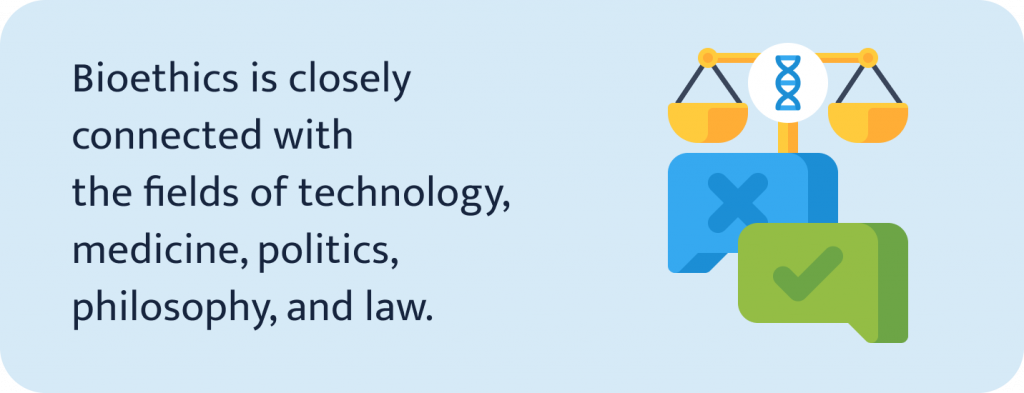
- What should be done with the child of a brain-dead pregnant woman?
- How important is a subject’s anonymity during research?
- Discuss the ethics of shared decision-making .
- How much responsibility do mentally challenged people carry for their actions?
- Was Sweden right not to impose strict lockdown rules during the COVID-19 pandemic?
- To what extent are businesses responsible for their employees’ health?
- Should universal healthcare be free?
🚓👮 Criminal Justice Ethics Topics to Write About
Law enforcers should always act ethically. Unfortunately, it is not always the case. Police officers and attorneys often end up in morally ambiguous situations. In many cases, they don’t do what the public deems the right thing. Below are the examples of criminal justice ethics topics.
- When is it legitimate for a police officer to use violence?
- How can an officer remain impartial?
- Should law enforcement visibly wear guns in public?
- How much force is too much?
- Investigate possible ethical implications associated with true crime podcasts.
- Should prostitution be legal in the US?
- How ethical is interrogation ?
- Can torture be justified?
- Discuss the ethical consequences of lying when working in criminal justice .
- Is working undercover deception?
- Debate whether it is an American citizen’s moral duty to participate in jury duty.
- Should the police be allowed to access everyone’s data?
- Discuss the moral complications of “innocent until proven guilty.”
- Should convicted pedophiles be allowed to see their children?
- Can teaching ethics at schools prevent crime?
- Analyze ethical problems of the Stanford Prison Experiment.
- Should NATO have become involved in America’s Afghan war?
- What are the ethical implications of shooter drills at school?
- Was Edward Snowden morally in the wrong?
- How should we deal with child soldiers?
- Discuss if the prosecution of Julian Assange is justified.
- Examine the ethical problems of private prisons.
- What moral obligations should someone consider when granting prisoners the right to work?
- When is capital punishment justified?
- Is it ethical to incarcerate juvenile offenders ?
⚖️ Ethical Dilemma Topics to Write About
An ethical issue becomes a dilemma when different moral standards clash with each other. In this situation, it is impossible to find a path to an ethically permissible solution that is unambiguous. The following sample topics are a solid base to start a discussion on morals.
- Should parents watch over what their children do on the internet?
- Would you report an accident you caused if there are no witnesses?
- What should a doctor do if a patient refuses life-saving treatment for religious reasons?
- Should you turn down a client if their political views do not match yours?
- Would you promote something you are not convinced of to get money?
- Should you lie to land a job that gets you out of poverty?
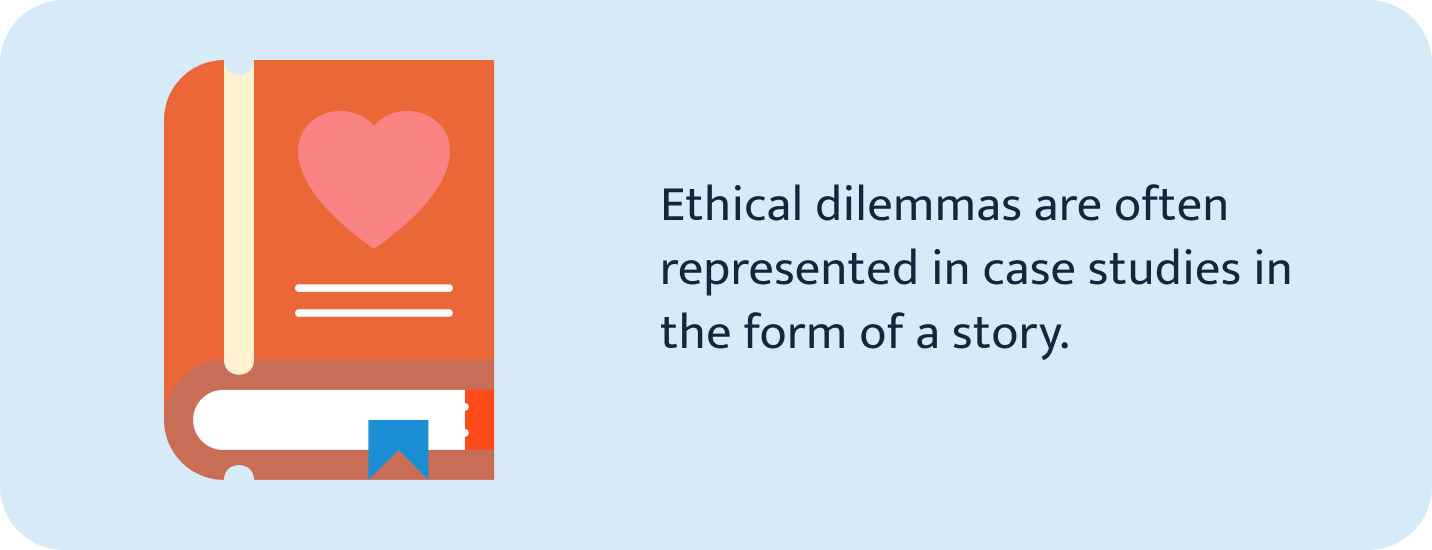
- Your partner cheated on you. Now, you get the chance to take your revenge with someone you really like. Would you do it?
- Should students use automated writing tools like free thesis generators , summarizers, and paraphrasers?
- Your teacher is continuously mocking your classmate. You are a teacher’s pet. Would you speak up?
- Your son likes to wear dresses. One day, he asks if he can wear one to school. Will you let him?
- You are very religious. Your daughter wants to get married to another woman and invites you to her wedding. What will you do?
- Prenatal testing showed that your unborn child has a disability. Would you terminate pregnancy?
- You are in a long-term relationship. Suddenly, your partner gets a job offer in another part of the world. What would you do?
- You have a terminal illness. This makes you a financial burden to your relatives. Are you obliged towards them to quit your treatment?
- You have a red and a blue candy bar. Blue is your favorite, but you also know that it’s your friend’s favorite. Will you give it to them?
- A friend asked you for a loan. Since then, they have not given you anything back. They are still not wholly stable financially. Will you ask them to return the money?
- Your grandma passed away and bequeathed her favorite mink coat to you. You are a vegan. What do you do?
- A few years ago, you borrowed a gun from a friend. Now, they ask for it back, but their mental state seems to be rapidly deteriorating. This makes you scared they are going to shoot someone, or themselves. What do you do?
- You find out that your friend cheats on their spouse. You are close friends with their family. Will you tell on them?
- For your birthday, your friend gave you a sweater they’ve made themselves. You think it’s ugly. Do you tell them?
- You are a vegan . Should you buy vegan products which are highly problematic to produce?
- You are in a restaurant. Your order arrives too late. The waitress looks stressed. Will you make her take it back?
- You went to the store and bought a new, expensive item. The clerk gives you too much change. Do you give it back?
- You are walking with a friend and find $50 on the floor. Would you share it with them?
- Your child firmly believes in Santa Claus. One Christmas , they start suspecting that he is not real. What do you do?
- Is having pets ethical?
- Can eating meat be justified?
- Should we defund the police?
- Should atomic bombs be banned?
- Can discrimination be justified?
- Is it ethical to ask someone’s age?
- Should children get paid for chores?
- Is it unprofessional to send voice messages?
- Should children be allowed to vote?
- Should influencers promote products they don’t use?
- Should there be any limitations to doctor and patient confidentiality?
- Should physician-assisted suicide be allowed?
- Can teenagers get plastic surgery?
- What to do when you find out that your relative has committed an offense?
- What to do when you see your friend cheating on the exam?
- Should sportsmen be paid more than teachers?
- Should gender quotas be used during parliamentary elections?
- Do companies have the right to collect information about their customers?
- Can politicians appeal to religious issues during electoral campaigns?
- Should fake news be censored in a democratic society?
We hope that in this list you’ve found the ethics topic that fits you the best. Good luck with your assignment!
Further reading:
- 430 Philosophy Topics & Questions for Your Essay
- 226 Research Topics on Criminal Justice & Criminology
- 512 Research Topics on HumSS (Humanities & Social Sciences)
- 204 Research Topics on Technology & Computer Science
- What’s the Difference Between Morality and Ethics?: Britannica
- What is Ethics?: Santa Clara University
- Ethics: Internet Encyclopedia of Philosophy
- Metaethics: Stanford Encyclopedia of Philosophy
- Ethical Issues: Idaho State University
- The Problem with AI Ethics: The Verge
- Sports Ethics: Santa Clara University
- What Is Bioethics?: Michigan State University
- Ethics in Criminal Justice: Campbellsville University
- Kant’s Formula of Universal Law: Harvard University
- Share to Facebook
- Share to Twitter
- Share to LinkedIn
- Share to email

A definition explains the meaning of a term or a concept. In a dictionary, you’ll find a definition in a single sentence. A definition paper, however, encompasses several paragraphs. Such an essay, amongst other things, can include personal experience and examples. To write a successful definition paper, you need to...

As simple as it is, the purpose of the descriptive essay is to explain or portray its subject. It can focus on any topic or issue you want to write about. Be sure that any middle school, high school, or college student can manage this type of creative writing assignment!...

Rhetorical analysis essay focuses on assessing the method used for delivering a message. This assignment isn’t about giving an opinion on the topic. The purpose is to analyze how the author presents the argument and whether or not they succeeded. Keep reading to find out more strategies and prompts for...

A narrative essay tells a story about a series of events. At the core of this kind of essay can be a personal experience or a fictional plot. Any story can be a basis for a narrative essay! Narratives can look similar to descriptions. Still, they are different. A descriptive...

Similar to the instructions in a recipe book, process essays convey information in a step-by-step format. In this type of paper, you follow a structured chronological process. You can also call it a how-to essay. A closely related type is a process analysis essay. Here you have to carefully consider...

In a classification essay, you divide the subject into categories. To create these categories, you single out certain attributes of things. You can classify them according to their characteristics, themes, or traits. Sounds complicated? Be sure that any high school or college student can manage this type of essay!

Throughout your high school years, you are likely to write many evaluative papers. In an evaluation essay you aim is to justify your point of view through evidence.

Immigration is a permanent move to a foreign country. It takes place all over the globe, including the United States. It played an important role in history, and it continues to influence society today. This article offers a variety of immigration essay topics. They are suitable for college-level works, as...

Should you buy a green or a red apple? Before making a decision, people often compare their options. In a compare and contrast essay, you analyze the similarities and differences between certain things. In this article, you’ll find interesting and easy compare and contrast essay topics for college, high school...

An opinion essay requires a student to present a point of view on a chosen subject and back it up with substantial evidence. Like in a debate, the writer has to give their opinion and defend it while using scholarly resources. This article will help you find a good opinion...

It would be great if economics in college would just teach you how to save and make money. In reality, however, students usually write research papers on micro- and macroeconomics topics to learn about the production and consumption of goods on an international level.

The corporate world is the world of the future – there’s no doubt about that. And education in ABM will help you conquer it! What is ABM strand, exactly? ABM stands for Accountancy, Business, and Management. Future leaders and entrepreneurs pursue education in this field to learn the skills essential...
Home — Essay Samples — Philosophy — Ethics in Everyday Life — The Importance of Ethics In Everyday Life
The Importance of Ethics in Our Daily Life
- Categories: Ethics Ethics in Everyday Life Personal Ethics
About this sample

Words: 530 |
Published: Oct 2, 2020
Words: 530 | Page: 1 | 3 min read
Why I Share the Importance of Ethics in Our Daily Life?

Cite this Essay
Let us write you an essay from scratch
- 450+ experts on 30 subjects ready to help
- Custom essay delivered in as few as 3 hours
Get high-quality help

Verified writer
- Expert in: Philosophy

+ 120 experts online
By clicking “Check Writers’ Offers”, you agree to our terms of service and privacy policy . We’ll occasionally send you promo and account related email
No need to pay just yet!
Related Essays
1 pages / 508 words
3 pages / 1419 words
1 pages / 554 words
1 pages / 610 words
Remember! This is just a sample.
You can get your custom paper by one of our expert writers.
121 writers online
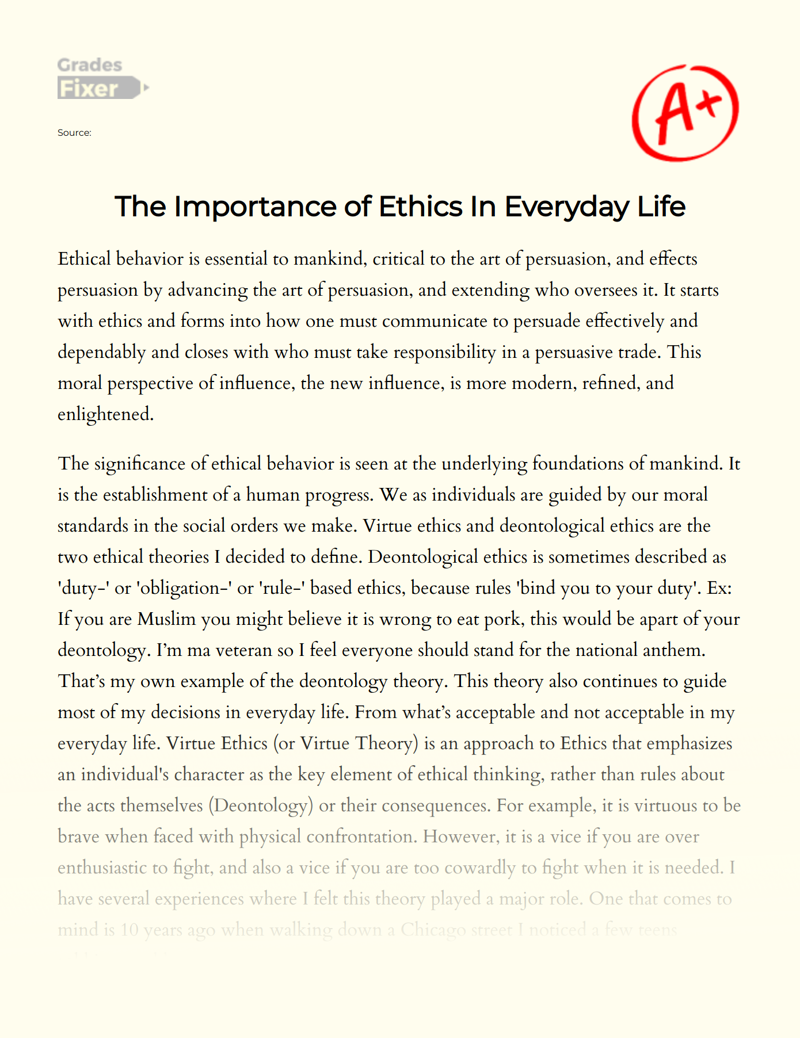
Still can’t find what you need?
Browse our vast selection of original essay samples, each expertly formatted and styled
Related Essays on Ethics in Everyday Life
The case of Frank Timmons, a manager at a manufacturing company, presents a complex ethical dilemma that challenges traditional notions of leadership. In this essay, we will explore the background of the case, analyze the [...]
NST. (2018, October). Nurturing noble values: Addressing changes in lifestyle major challenges. Retrieved from [...]
In a world driven by various motivations and influences, the ethical choices we make often come with the challenge of aligning our actions with what we believe is morally right. The phrase "doing what is right is not always [...]
The importance of ethics in personal life cannot be overstated. Ethics serve as the moral compass that guides our decisions, actions, and interactions with others. In this essay, I will explore the significance of ethics in our [...]
Many of the values and beliefs I possess, I actually developed at very early age. And as I have grown, my values have also changed or gone through numerous tests. And though I have held onto most of my values and beliefs, I [...]
In his article, “Living on a Lifeboat,” population biologist Garrett Hardin made an influential, albeit controversial, argument regarding the process of wealth and resource distribution (Hardin 1974). This paper will explore his [...]
Related Topics
By clicking “Send”, you agree to our Terms of service and Privacy statement . We will occasionally send you account related emails.
Where do you want us to send this sample?
By clicking “Continue”, you agree to our terms of service and privacy policy.
Be careful. This essay is not unique
This essay was donated by a student and is likely to have been used and submitted before
Download this Sample
Free samples may contain mistakes and not unique parts
Sorry, we could not paraphrase this essay. Our professional writers can rewrite it and get you a unique paper.
Please check your inbox.
We can write you a custom essay that will follow your exact instructions and meet the deadlines. Let's fix your grades together!
Get Your Personalized Essay in 3 Hours or Less!
We use cookies to personalyze your web-site experience. By continuing we’ll assume you board with our cookie policy .
- Instructions Followed To The Letter
- Deadlines Met At Every Stage
- Unique And Plagiarism Free
Home / Essay Samples / Philosophy / Ethics / The Essence of Ethics: Understanding Its Significance
The Essence of Ethics: Understanding Its Significance
- Category: Philosophy
- Topic: Ethics , Ethics in Everyday Life , Personal Ethics
Pages: 2 (800 words)
- Downloads: -->
--> ⚠️ Remember: This essay was written and uploaded by an--> click here.
Found a great essay sample but want a unique one?
are ready to help you with your essay
You won’t be charged yet!
Philosophy of Education Essays
Meaning of Life Essays
Human Nature Essays
Good and Evil Essays
Truth Essays
Related Essays
We are glad that you like it, but you cannot copy from our website. Just insert your email and this sample will be sent to you.
By clicking “Send”, you agree to our Terms of service and Privacy statement . We will occasionally send you account related emails.
Your essay sample has been sent.
In fact, there is a way to get an original essay! Turn to our writers and order a plagiarism-free paper.
samplius.com uses cookies to offer you the best service possible.By continuing we’ll assume you board with our cookie policy .--> -->